Speech Writing
Commemorative Speech

Commemorative Speech - Writing Guide, Outline & Examples
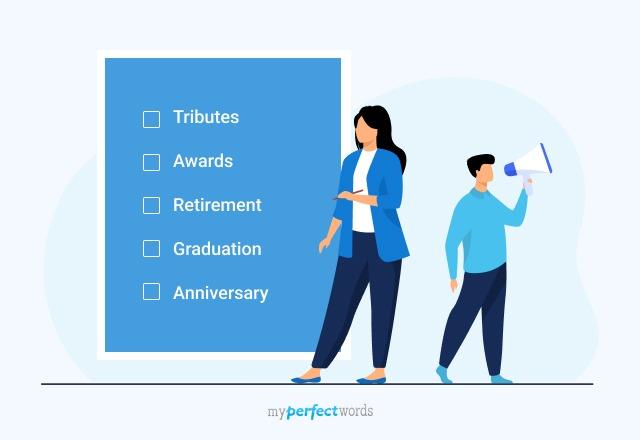
People also read
The 10 Key Steps for Perfect Speech Writing
Understanding the Speech Format - Detailed Guide & Examples
How to Start A Speech - 13 Interesting Ideas & Examples
20+ Outstanding Speech Examples for Your Help
Common Types of Speeches that Every Speechwriter Should Know
Good Impromptu Speech Topics for Students
Entertaining Speech Topics for Your Next Debate
How to Write a Special Occasion Speech: Types, Tips, and Examples
Introduction Speech - A Step-by-Step Guide & Examples
How to Write the Best Acceptance Speech for Your Audience?
Presentation Speech - An Ultimate Writing Guide
Farewell Speech - Writing Tips & Examples
How to Write an Extemporaneous Speech? A Step-by-Step Guide
Crafting the Perfect Graduation Speech: A Guide with Examples
Ready to explore the world of commemorative speech writing? Don't worry, it's not as tricky as it sounds!
In this guide, we'll make it super easy for you. We've got all the tips and examples you need to create perfect commemorative speeches for any occasion. Whether it's for your school project, a graduation party, or a touching tribute to someone special, we've got your back.
Let's jump in and discover the secrets to crafting speeches that leave a lasting impression.
- 1. Commemorative Speech Definition
- 2. Commemorative Speech Outline
- 3. How to Write a Commemorative Speech
- 4. Types of Commemorative Speeches
- 5. Commemorative Speech Examples
- 6. Commemorative Speech Topics
Commemorative Speech Definition
A commemorative (or ceremonial or epideictic) speech is defined as an address of honor delivered to celebrate or praise the value of a person, group, place, event, idea, or institute.
This type of speech writing is not just verbal praise or appreciation. It is more of a celebration and acknowledgment.
The Importance of Commemorative Speeches
Commemorative speeches aren't just words thrown together; they serve a significant purpose in various aspects of life.
- Commemorative speeches honor people, events, and ideas that hold significant value.
- They help us remember history, culture, and achievements, preserving them for future generations.
- Commemorative speeches inspire and connect people emotionally, fostering a sense of unity.
- These speeches offer closure and healing, particularly during funerals or memorials.
- They provide a platform for celebrating achievements and milestones.
- Through commemorations, we ensure that important moments in our lives are never forgotten, leaving a lasting legacy.
Commemorative Speech Outline
Here's a simple commemorative speech outline example template:

Paper Due? Why Suffer? That's our Job!
How to Write a Commemorative Speech
Writing a commemorative speech is a special way to pay tribute to an important event or someone's life. Here are some simple steps to help you write one:
Step 1: Start with an Attention-Grabbing Opener
Your speech needs to capture the audience's attention from the very beginning. So start your commemorative speech with a compelling story, a relevant quote, a rhetorical question, or a surprising fact. The goal is to make the audience want to listen.
Step 2: Introduce the Occasion
Clearly state the reason for your speech. Let the audience know what or who you are commemorating and why this is a significant occasion. This sets the stage for your speech's focus.
Step 3: Acknowledge Challenges or Difficulties
If the subject of your commemoration faced any difficulties in their life or in being remembered, this is the place to address those challenges. It adds depth to your speech and shows resilience.
Step 4: Express Gratitude
Thank the audience for their presence and appreciation. Also, acknowledge any individuals or organizations who have contributed to making this commemoration possible.
Step 5: Include Personal Observations
Share personal stories, anecdotes, or observations that connect you to the subject or event. This personal touch makes your speech unique and relatable.
Step 6: Pay Tribute to the Subject & Highlight Their Achievements
This is the heart of your speech. Express your admiration, respect, and appreciation for the person or the significance of the event you're commemorating. Explain why they are deserving of this honor. Dive into the subject's significant accomplishments, qualities, or contributions. Use specific examples or stories to illustrate their impact on others and the world.
Step 7: Connect to the Audience
Relate the subject's life or the event to the audience's experiences and values. Show why this commemoration matters to them and how it can resonate with their lives.
Step 8: Address Why It's Important
Explain the broader importance of this commemoration. Discuss the lasting influence, lessons learned, or the impact the subject or event has had on society, culture, or individuals.
Step 9: Conclude with a Powerful Message
Summarize the significance of the commemoration and leave the audience with a memorable and thought-provoking message. This could be a call to action, a reflection on the subject's legacy, or a meaningful quote.
Step 10: Use Visual Aids (if necessary)
Visual aids like photographs, videos, or props can enhance your speech by providing a visual element to support your words. Use them when appropriate, but ensure they add value.
Types of Commemorative Speeches
Here's a table outlining different types of commemorative speeches:
Commemorative Speech Examples
Here are some famous commemorative speeches by renowned personalities:
- Martin Luther King Jr.'s "I Have a Dream" speech
- Ronald Reagan's Challenger Disaster speech
- Maya Angelou's eulogy for Coretta Scott King
Commemorative Speech on a Famous Person
Let’s take a look at a short commemorative speech example:
Commemorative Speech Examples PDF
To provide you with tangible insights into commemorative speeches, we've provided free commemorative speech examples in this section. Let’s take a look:
Graduation Ceremony Speech Example
Commemorative Speech Example
Tough Essay Due? Hire Tough Writers!
Commemorative Speech Topics
Choosing the right topic is essential for speech writing. Here are some interesting commemorative speech topics, take a look:
- A tribute to a loving spouse
- A tribute to caring parents
- The sacrifice of a teacher
- A perfect example of human courage
- A human who overcame a challenge
- Celebrating Islamic values
- Praising the women’s rights movement in the United States
- Respect makes any relationship better
- Hard work is the only shortcut to success.
- Teamwork improves the performance of organizations.
- Leadership is an innate ability.
Writing an inspiring speech can be tricky. But once you know what you have to write and how to structure it, the process becomes easier.
If crafting speeches proves to be a challenge, consider obtaining a professionally written speech from MyPerfectWords.com.
Our paper writing service online offers tailored content for speeches, essays, research papers, term papers, and reports.
Don't wait! Hire an experienced writer now to buy speech .

Write Essay Within 60 Seconds!

Dr. Barbara is a highly experienced writer and author who holds a Ph.D. degree in public health from an Ivy League school. She has worked in the medical field for many years, conducting extensive research on various health topics. Her writing has been featured in several top-tier publications.

Paper Due? Why Suffer? That’s our Job!
Keep reading


How to deliver a ceremonial speech? A Full Guide
- Filed under: Public speaking articles , Public speaking tips and tricks , Speaking tips , Speech delivery
There are certain times in your life that are going to involve ceremony, whether it is getting sworn into a local office, as a school board member, being named head of the PTA or perhaps officiating someone’s wedding. All these occasions are marked by certain ceremonial speeches.
So, how to make a good ceremonial speech? A ceremonial speech is not about you. Usually it focuses on and celebrates someone’s values and accomplishments and gives the audience hope for the future. Therefore, take the spotlight off of you and put it on the celebrated person, event or occasion.
A ceremonial speech is not the time to start telling stories or all the other normal things of stagecraft. It is the time to honor someone or something, so stick to the script. Easier said than done. Therefore, this post is going to show you how to prepare a good commemorative speech.
So, let’s hop in now.
As a side note: there’s a lot more to public speaking you should know so I wrote a guide about best public speaking books to read. Check out these books here .
Table of Contents
What is a ceremonial speech?
A ceremonial speech is by definition a formal speech. I get nervous when people use the phrase “formal speech,” because typically what the average speaker means is that they want to have license to do a boring data dump to enumerate everything they’ve done in the last quarter.
It may feel formal because you’re in a stuffy boardroom and the people to whom you’re talking are important. But if you make it formal in the sense of “I’m going to be stiff and straight and read for 20 minutes,” then that’s not a formal speech – that’s an awful speech.
Put the spotlight back on the occasion
Ceremonial presentations are different. You’re not trying to come up with new concepts and you’re not trying to dazzle people with your cleverness or with your original ideas.
In fact, this is a time to take the spotlight off of you and put the spotlight on a person, event, office or occasion – whether it’s the wedding or whether it’s the funeral.
Your main goal is to praise or pay tribute
The main goal of the ceremonial speech is to praise (or pay a tribute to) a person, an institution, an event or an idea.
Focus on the values
A ceremonial speech is not an informative or persuasive speech . Usually it focuses on and celebrates someone’s values and accomplishments, and if it is well done, it gives the audience hope for the future.
It’s a way of getting people to reflect on larger and eternal values – things that are not new and things that are not associated with your ideas.
So that’s what’s different about ceremonial speeches. In some ways it does make it easier. You don’t have to go out of your way to juice it up or to make it more invigorating or exciting.
You’re not trying to put your personal stamp on a ceremonial speech.
So please keep in mind that this is the one time when you’re giving a presentation where your personality shouldn’t overwhelm your message.
Recommended books
How to Deliver a TED Talk: Secrets of the World's Most Inspiring Presentations
Jeremy Donovan
Resonate: Present Visual Stories that Transform Audiences
Nancy Duarte
Confessions of a Public Speaker
Scott Berkun
Talk Like TED: The 9 Public-Speaking Secrets of the World's Top Minds
Carmine Gallo
The Checklist Manifesto: How to Get Things Right
Atul Gawande
The First 20 Hours: How to Learn Anything... Fast!
Josh Kaufman
What is the difference between a ceremonial speech and a commemorative speech?
Basically, they are synonyms and there is no difference between a ceremonial speech and a commemorative speech. Sometimes you may also hear that someone says something about an “epideictic speech” and this is also a synonym for a ceremonial speech.
All these speeches have to highlight the main reasons of the event and, if possible, inspire your audience.
What are the types of ceremonial speeches?
Here are some types of the ceremonial speeches:
- Wedding toast
- Farewell speech
- Acceptance speech
- Nomination speech
- Goodwill speech
- Dedication speech
- Presentation speech
- Introductory speech
- Retirement speech
- Graduation speech
- Tribute speech
Why are ceremonial speeches important?
First of all, I want to commend you for taking the whole concept of ceremonial speeches seriously.
Too many people say, “Well, you know… it’s just uttering a few words; it’s just procedures, really. No big deal. ” And then they get up, they’re nervous, they’re uncomfortable and maybe there are tears in their eyes. All sorts of things can go wrong when you’re giving a short ceremonial speech.
Here’s the thing though: for many people in the audience – and these days people watching on YouTube – if you get it wrong that could be your legacy. That could be what people talk about – your mistakes.
So, you don’t want to get it wrong.
You want to prepare, but I must tell you that it’s a different sort of preparation . It’s not like preparing a 60-minute keynote speech. Also, it doesn’t involve PowerPoint . A ceremonial speech seems deceptively simple but it can still be easy to screw up if you trip over words.
Look no further than Barack Obama’s inaugural address in 2012 where Chief Justice Roberts kind of messed it up. And believe it or not, there was even some frivolous lawsuits saying that Barack Obama wasn’t legally entitled to hold office because he got one of the words wrong with his oath of office.
The point is: you’ve got to take it seriously. If you don’t get it just right it can cause all sorts of headaches and that’s why it does take some preparation, thought and planning.
How to prepare for a commemorative speech?
If you are at some sort swearing in ceremony where you have to use official wording, then my biggest tip for you is:
- Make it fill your sheet by using a huge font
Make your notes big
If the text is really long (and by long, I mean more than 35 words) then you can also do it, although ideally it fits on a single sheet of paper. That way you’re not fumbling with glasses. You can simply glance down, scoop up a few words and keep going.
This keeps you on track.
Useful reading: “How to Use a Teleprompter During your Speech? A Complete Guide”
Your cheat sheet needs to be usable
The problem most people have if they type the speech in normal font size is that they have to hold the script close to their face and sometimes lean on the paper.
So, what happens is people sometimes squint and that’s the reason they get a word or phrase wrong or they start with the wrong sentence. Then they have to go back, repeat or correct.
Don’t set yourself up for failure. Have your speech ready with nice gigantic text so you don’t have to memorize anything.
And the pressure’s off.
Useful reading: “How to Outline a Presentation: A Complete Guide From a Pro”
- Focus on the task at hand
When you’re giving a ceremonial speech, focus on the task and moment at hand. That means it’s not all about “me-me-me.”
At the beginning of the ceremonial speech, I wouldn’t talk about, “Oh gosh! This is such a big honor. Well I’m so honored.”
There may be a point later on when you do have free reign to speak about the event and what’s going on. But for the official ceremonial part, don’t talk about what an honor it is for you.
Also, don’t talk about how nervous you are. “Oh my gosh, I’m so nervous! I hope I don’t mess up the oath of office.”
It’s not about you. It’s about what is actually going on and the institutions involved. So, don’t make everything about you – just deliver the presentation.
Useful reading: “10 great tips on how to give a killer speech without notes?”
Don’t memorize your speech
If you are speaking at an event where someone has to repeat your words, then reading from one sheet of paper will be a lot easier for them, too. And it just takes all the pressure off things, because the thing about ceremonies is there’s lots of emotion.
For example, it may be the crowning achievement of your life to be sworn in as president of the American Bar Association and therefore you may be incredibly happy.
But when you’re feeling all these emotions, that’s the worst possible time to put extra pressure on your brain to recall information. So, don’t put that extra pressure on yourself.
And if you need to the just glance down at the words and read – there’s nothing wrong with that whatsoever for a ceremonial speech.
But, if you still decide to memorize your speech, then take a look at this article here: “How to memorize a speech in less than an hour?”
You need good volume
All of a sudden, you’re standing in front of more people than you’ve ever stood in front of in your life. Now you have stage fright and you’re nervous. You shrink up, your vocal cords tighten and you are whispering.
It is normal to be nervous during your speech. Sometimes it happens that you’re so nervous and quiet that people can’t understand you. It’s a common problem.
I’m not suggesting that you be bombastic and yelling at people, but you need good volume because what’s the point of the ceremony and people gathering if they literally can’t hear you?
So, if you practice your commemorative speech at home, make sure that you’re loud enough.
Useful reading: “How to Use Your Voice Effectively in a Presentation?”
The next thing I want to point out is if you’re nervous you can lose perspective of your speed, resulting in speaking too quickly. But if you’re rushing, you’re going to look scared. You’re going to look nervous.
You’re going to look uncomfortable and people are going to stop focusing on the ceremony and instead start focusing on you.
And as you’ve heard me say – the focus shouldn’t be on you, whether you’re comfortable, uncomfortable, nervous or any of that.
The focus should be on the ceremonial aspects of what’s going on. That’s why it’s critically important you don’t rush.
Videotape yourself
The best way to practice your speech is by recording yourself. So, take a camera and capture yourself giving a ceremonial speech. Now, take a look at the video you made and write down everything you liked about it and everything you didn’t like about it.
After that, repeat taping as many times as needed until you’re feeling comfortable and happy. If you do that, I guarantee you’re going to be in great shape.
Final thoughts: How to give a ceremonial speech?
If after reading this article you think that this is a large bite to swallow, just remember some of the basics:
- Have a cheat sheet
- Don’t memorize, don’t rush
- Think about speed and volume
Usually this is probably a day of celebration. Of course, there are exceptions; funerals, obviously.
But if it is a day of celebration, let that smile come across your face when you’re speaking. If it’s a certain honor, or if you’re being sworn into a major office, let the honor exude and just come out of your pores and let it shine through your voice.
Do that and you will be in great shape for your ceremonial presentation and all the other presentations you give.
Related questions
How long should a ceremonial speech be? Usually the length of the speech is up to five minutes but this is not a rule of thumb. Mostly it depends on the event; therefore, you should ask from the organizer how much time they expect you to speak. Be aware, though, that less is always more.
What is the purpose of an acceptance speech? During the acceptance speech, you have an opportunity to show your honest appreciation for the award given and thank the people who helped you along the way. Like a ceremonial speech, an acceptance speech is not about you.
How do you greet the audience in a speech? Keep your greeting short and simple. Grab the attention of the audience, get the members of the audience involved and start with the introduction of your speech.
Recommended books on how to write a ceremonial speech

"It Gives Me Great Pleasure...": A Guide to Writing Ceremonial Speeches
Alan Perlman

Lend Me Your Ears: All You Need to Know about Making Speeches and Presentations
Max Atkinson
Posts about public speaking you may also like

16 secret ways how to speak to a bored audience
One of the many nightmares of public speaking is having a bored audience. It happens to everyone, but it doesn’t make it any less worrisome.

Delivering an informative speech: 7 key tips every speaker should follow
Delivering an informative speech seems somehow easier than giving a big sales pitch or giving a speech at a conference. There are all sorts of

How to Use a Teleprompter During your Speech? A Complete Guide
Using a teleprompter can be a great way to effectively communicate the contents of a speech in a somewhat controlled way so that you don’t
- Tags: Art of public speaking , Effective speaking , Good speech , Impromptu presentation , Impromptu speaking , Impromptu talk , Introduction to a Speech , Prepared speech , Public speaking topics , Stage phobia
Recommended gear

Best Portable Speakers For The Presentations
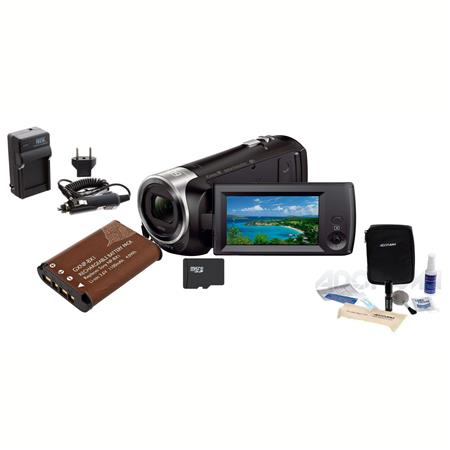
Best Video Cameras for Public Speakers

Best rresenter remotes for public speakers

Best Portable Thumb Drives And Hard Drives for the Presentations
Who is janek tuttar.
My name is Janek Tuttar , and I am the founder and author of Speak and Conquer website.
I have been teaching public speaking at Estonian Entrepreneurship University of Applied Sciences
Here, I am sharing the wisdom of how to cope in different public speaking situations.
More information about Janek »

Share this post

Hi! My name is Janek Tuttar, and I am the founder and author of SpeakAndConquer.com.
I have been teaching and blogging about public speaking since spring 2007. Here, I am sharing the wisdom of how to cope in different public speaking situations.
Send me an e-mail: [email protected]
LEGAL INFORMATION
This site is owned and operated by Janek Tuttar. SpeakAndConquer.com is a participant in the Amazon Services LLC Associates Program, an affiliate advertising program designed to provide a means for sites to earn advertising fees by advertising and linking to Amazon.com.
This site also participates in other affiliate programs and is compensated for referring traffic and business to these companies.

Best teleprompters

Best Computer Mice for the Presentations
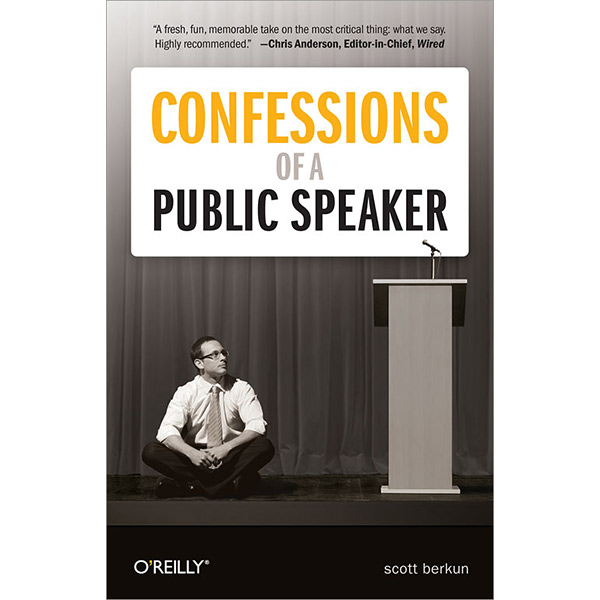
Best Laptop Backpacks for Public Speakers
Speech And Debate
Commemorative Speech
Last updated on: Feb 9, 2023
Commemorative Speech: Guide to Craft an Engaging Speech
By: Cordon J.
Reviewed By: Chris H.
Published on: Sep 15, 2020

A commemorative speech is also known as a ceremonial speech. It is a type of speech given on a special occasion or event to celebrate a particular situation, event, or a person/group. It is mostly given to pay tribute or show gratitude towards an event, idea, or person.
By commemorating you inspire or give the audience hope for the future, boost their feelings and emotions.
To learn how to craft effective commemorative speeches, give this article a thorough read.

On this Page
What is a Commemorative Speech
As we mentioned earlier, a commemorative speech is a form of public speaking where the main purpose is to celebrate a particular thing.
Most students in the United States are asked to deliver an inspiring commemorative speech at the graduation ceremony. Here students express their gratitude towards their college, professors, family, classmates, etc.
For such occasions, you must write from the heart, reminiscing about the past and the important events. This kind of speech includes personal touch and the tips and tricks given here will help you write a speech successfully.
Commemorative speech requires a focus on the past, present, and future aspects of the topic. For instance, success, loyalty, wisdom, courage, hope, etc.
It can also be an award acceptance speech, or a eulogy to honor someone after their death. Now that you have understood the commemorative speech definition, let’s take a look and learn how to write a commemorative speech?

Tough Essay Due? Hire Tough Writers!
Commemorative Speech Outline
Just as any other piece of writing, a speech follows a particular outline and structure.
Begin the speech by stating the significance of your topic.
Make it interesting to grab the audience’s attention. If you’re talking about a person, share an interesting thing that they did or said. If your speech is about a particular event, discuss how it brings different people together, etc.
Your reason for paying tribute.
Why are you paying tribute to your subject and the kind of tribute? Why should they be honored and why at this particular event.
Highlight their achievements.
Next, talk about the contributions and accomplishments with examples and evidence.
Importance of these achievements.
Highlight the importance of these accomplishments, who benefits from them? How are these efforts valuable to us?
Make the audience empathize.
If talking about a person, make the audience think about how they can also become like that person, what practices can we learn and adopt?
In this section, the transition towards a brief summary of the speech. Share an anecdote or short story.
Commemorative Speech Examples
COMMEMORATIVE SPEECH EXAMPLE
COMMEMORATIVE SPEECH SAMPLE
How to Choose a Commemorative Speech Topic
When asked to deliver a commemorative speech for a class, you must first brainstorm different ideas that can be added to your speech.
Consider the following points in mind when brainstorming different topics:
Online Research
There is a list of commemorative speech topics available online. You can also find videos of previous commemorative speeches delivered at your school or by celebrities, etc.
Brainstorming potential ideas will enable you to come up with a topic relevant to you and your personal situation.
In order to make your speech and topic meaningful, think of the things you would want to share about the person. Or the information you want to share with others about a situation or event.
When thinking about the different stories to add, consider sharing that maybe you would want to hear in a commemorative speech.
If you are talking about a person then think of ways how you can share things about them respectfully, without offending them or anyone else.
Understand Your Audience
The most important ingredient that makes any piece of writing or speech work is the audience. It is they who decide whether or not the piece was worth it.
In order to ensure that you stay relevant to the audience, keeping in mind their interests and personalities and build your work around that.
Also, if you are going to mention someone directly in your speech you must be aware of the people who are going to be there.
Convey a Meaningful Message
A commemorative speech is a type of informative speech where the aim is to inform the listener about a particular topic. Although the main goal is to praise or commemorate something, your message must be clear and meaningful throughout the rest of the speech.
A speech writing guide will help you create an impactful and impressive speech.
Paper Due? Why Suffer? That's our Job!
Commemorative Speech Topics
There are several different categories of commemorative speech ideas depending upon the event or occasion.
Here are some of our best suggested commemorative speech ideas that you can choose from:
- Paying tribute to a family member
- Paying tribute to an important personality, dead or alive (Martin Luther King, Barack Obama)
- Paying tribute to a big movement (Women's rights movement, the civil rights movement)
- Celebrating the values of a religion (Buddhist values)
- Speak on the importance of hope (NASA's Apollo 13 survival mission)
- Celebrate human courage, or a courageous act in a challenging situation by policemen, firefighters, veterans
- Selflessness of a teacher or parent, their dedication and love
- An act of compromise that marked the start of you becoming a mature and evolved person
- Show respect to the greatest travelers that ever lived (Christopher Columbus, Vasco da Gama)
- Eulogy for a professor at your college
- Speak about your transformation both spiritually and intellectually after starting college
- The series of events that lead to you and your classmates becoming a family
- A time you and your team won a match due to the support of the College
- Provide an example of loyalty by discussing war comrades
- What does freedom mean to you?
- Commemorate the lives lost on 9/11
- Celebrate the legalization of gay marriages
- Queen Elizebeth and her life
- Buying your first house
- Remembering your grandmother
- Women who changed the world for the better
- Father of the bride speech
- Maid of honor speech
- Best technology inventions
Here is a little activity for you to clarify the concept of commemorative speech. Which of the following is an example of a commemorative speech?
- A speech that demonstrates how to plan a wedding.
- A speech honoring the life of Martin Luther King.
- A speech telling the people where they can find the work of Vincent Van Gogh.
- A speech for the school board to get funding for the school dance.
These were some of the topics for a commemorative speech just to give you an idea of what direction to think in. You may use these topics as is, or brainstorm staying on this track and you'll have an inspiring topic to talk on.
If you are unable to come up with an engaging topic, feel free to reach out to the expert writers at 5StarEssays.com .
Request an essay for me ! Enjoy a well-crafted commemorative speech at the most affordable prices and leave everyone in awe.
Frequently Asked Questions
What is the goal of a commemorative speech.
A commemorative speech is delivered to inspire the audience and to pay tribute to a person. It highlights the qualities and works of the person.
Is eulogy a commemorative speech?
A eulogy is a kind of commemorative speech and it also includes other kinds of speeches also.

Cordon. is a published author and writing specialist. He has worked in the publishing industry for many years, providing writing services and digital content. His own writing career began with a focus on literature and linguistics, which he continues to pursue. Cordon is an engaging and professional individual, always looking to help others achieve their goals.
Was This Blog Helpful?
Keep reading.
- How to Write a Speech - Outline With Example

- Informative Speech Topics - Interesting Ideas By Experts

- Persuasive Speech Topics - 150+ Topics for Students

- 50+ Demonstration Speech Ideas for Your Next Great Speech

- Impromptu Speech Topics - 150+ Interesting Ideas

- Debate Topics (2024) - Top 200+ Compelling Topics

- 100+ Motivational Speech Topics for an Inspirational Speech
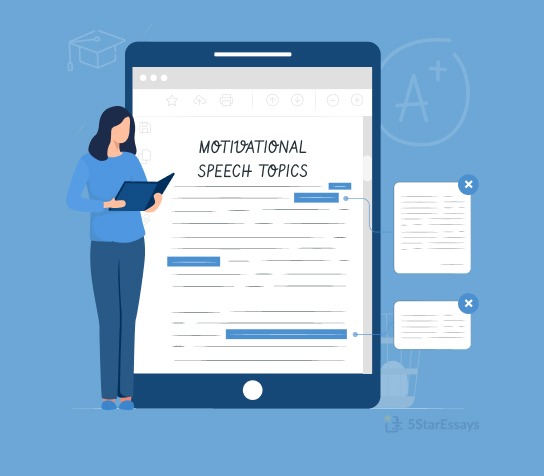
- Extemporaneous Speech - How to Write One Successfully?

- Graduation Speech - Write Your Best Graduation Speech

People Also Read
- obesity essay writing topics
- how to start an essay
- book report outline
- opinion essay
- essay writing old
Burdened With Assignments?

Advertisement
- Homework Services: Essay Topics Generator
© 2024 - All rights reserved

- school Campus Bookshelves
- menu_book Bookshelves
- perm_media Learning Objects
- login Login
- how_to_reg Request Instructor Account
- hub Instructor Commons
- Download Page (PDF)
- Download Full Book (PDF)
- Periodic Table
- Physics Constants
- Scientific Calculator
- Reference & Cite
- Tools expand_more
- Readability
selected template will load here
This action is not available.

1.11: Ceremonial Speaking- Identification, Magnification, Narration
- Last updated
- Save as PDF
- Page ID 128389

- University of Arkansas

Words have incredible power. They can make people’s hearts soar, or they can make people’s hearts sore. – Dr. Mardy Grothe psychologist and author
The category of speeches that you are most likely to have to give is ceremonial speeches. Ceremonial speaking, originally called epideictic oratory, includes graduation speeches, wedding speeches, eulogy speeches, after-dinner speeches, award speeches, toast speeches, and tribute speeches. The biggest thing that these have in common is that they have a heavy emphasis on pathos-emotion. When listening to a ceremonial speech, an audience expects to feel something and to feel a part of something. To achieve that, a good ceremonial speech will include identification, narration, and magnification.
In many ways, special occasions are the punctuation marks of life. They are the rituals that draw us together in celebration of some person or event Teri and Michael Gamble communication scholars
This chapter will look at identification, magnification, and narration and how they function in ceremonial speeches to help you prepare to construct a speech of your own.
Types of Ceremonial Speeches
- Speech of Introduction
- Award Speech
- Acceptance Speech
- Graduation Speech
- Tribute Speech (Can be to a person, occasion, or monument)
- Eulogy Speech
- After Dinner Speech
- Toast Speech
Identification
In all speeches, the audience should feel like you are considering their needs, this is especially true in a ceremonial speech. In a ceremonial speech, your audience in some way becomes part of the speech. To achieve this, you should use a lot of phrases like “we” and “our.” In the graduation speech by Matthew McConaughey, he uses “we,” and “you” words over 400 times–that is a lot of identification!
Matthew McConaughey Graduation Speech, A Lesson in Identification
Thumbnail for the embedded element "Matthew McConaughey University of Houston Speech""title="Matthew McConaughey University of Houston Speech"src="/@api/deki/files/87671/hqdefault-45.jpg"/>
VIDEO IS UNAVAILABLE ^ A YouTube element has been excluded from this version of the text. You can view it online here: https://uark.pressbooks.pub/speaking/?p=41
He uses “you” nearly 250 times and “we” 170 times in a 45-minute speech
- You guys and girls, and young men and women are the reason I’m here.
- I’m really looking forward to talking with you all tonight.
- You heard my dad played football here.
- I thought about what you would want, I thought about what you might need.
- I also thought about what I want to say and what I need to say. Hopefully, we’re both going to be happy on both
- It means you got an education. It means you have more knowledge in a specific subject, vocation. It means you may have more expertise in what your degree is in. But what’s it worth in the job market out there today?
- So, while we’re here, and they’re going to run across the jumbotron, let’s make it a place where we break a sweat. Where we believe, where we enjoy the process of succeeding in the places in ways that we are fashioned to.
Fun fact: Matthew McConaughey is a professor of practice at the Moody College of Communication at the University of Texas at Austin. https://moody.utexas.edu/faculty/matthew-mcconaughey
More Examples of Identification
Here are a few ways that my students used identification in their speeches.
The Survivor Tree, an Elm, still stands as a witness of that day as a symbol of our resilience. The same kind of resilience all Americans have when faced with a tough obstacle to overcome. Tribute to OK City Memorial My grandpa Jack is like the wind. We can’t see him but we can feel him. He is always with us . Lily, Tribute to Grandpa Jack Today, we gather here to honor a famous, and beloved man, Stanley Martin Lieber. W e all knew him as Stan Lee He brought us together He may be gone but we will not forget what for he did for us . David Lester, Tribute to Stan Lee

Tip for Identification
When I do one-on-one speech consultations. I pull up two or three empty chairs and then I ask the person who I am coaching to tell me who is sitting in the chair and listening to their speech. I ask them to show me how that person is included in the speech. I read parts of their speech out loud with them thinking about people in those chairs and then we talk about how we can reword some things to make sure those folks feel included.
Magnification
In addition to identification, ceremonial speeches should contain magnification. Magnification is where you take an attribute of a person, and you magnify it and make it seem larger than life. It is where you highlight a positive attribute of a person or group. This works best if you tap into values that the audience share.
These are the most common magnification themes:
- Triumph over obstacles
- Unusual accomplishment
- Superior performance
- Unselfish motive
- Benefit to society
- The greatness of a simple thing
- Celebrate heroic acts and deeds
It is easiest to understand how these work in a speech by way of example. Watch the following speeches to understand how magnification can be achieved.
Oprah Winfrey's Eulogy to Rosa Parks, A Lesson in Magnification: Triumph Over Obstacle
Magnification is where you make an action larger than life. Notice how Oprah Winfrey elaborates on the action of Rosa Parks and makes it large and heroic.
I grew up in the South, and Rosa Parks was a hero to me long before I recognized and understood the power and impact that her life embodied. I remember my father telling me about this colored woman who had refused to give up her seat. And in my child’s mind, I thought, “She must be really big.” I thought she must be at least a hundred feet tall. I imagined her being stalwart and strong and carrying a shield to hold back the white folks.
…So I thank you again, Sister Rosa, for not only confronting the one white man who[se] seat you took, not only confronting the bus driver, not only for confronting the law, but for confronting history, a history that for 400 years said that you were not even worthy of a glance, certainly no consideration. I thank you for not moving.
And in that moment when you resolved to stay in that seat, you reclaimed your humanity, and you gave us all back a piece of our own.
Bill Clinton’s Eulogy for Muhammad Ali, A Lesson in Magnification: The Greatness of a Simple Thing
Before Mohammad Ali passed, he struggled with tremors. In this eulogy speech, Former President Clinton describes watching him light the Olympic flame. The mere act of walking was a simple thing that was made great by the circumstances.
- Finally after all the years that we have been friends, my enduring image of him is like a little reel in three shots: the boxer I thrilled to as a boy, the man I watched take the last steps to light the Olympic Flame when I was president, and I’ll never forget it, I was sitting there in Atlanta, by then we knew each other, by then I felt that I had some sense of what he was living with, and I was still weeping like a baby, seeing his hands shake and his legs shake and knowing by God he was gonna make those last few steps, no matter what it took. T he flame would be lit. The fight would be won. The spirit would be affirmed. I knew it would happen.
A Lesson in Magnification: Superior Performance
Narration- Tell a Story
In addition to identification and magnification, ceremonial speeches should include stories.

This example is from a University of Arkansas student speech and he is telling the story of picking out his first dog. Notice how the small details help to draw us in and help us to see the event unfold. I left this sample in speech format so you could see how it was written on his manuscript to have a feeling for the rhythm of the speech. (/// slanted lines, signal a pause…the more lines, the longer the pause)
It was a nice day and I can still picture you running towards me when I really try that is
As we approach the house,///
three little girls
accompanied by their father
open a shed door to the side of the property
I rode my Heelys /// down a small
//concrete sidewalk
Excited to see the little balls of fluff
My parents said to pick a good one
So I picked you /// because you bit my shoe.
Bryan Stevenson Tells a Story in an Award Acceptance Speech
Bryan Stevenson, author of Just Mercy: A Story of Justice and Redemption gave this acceptance speech when winning the Andrew Carnegie Medal for Excellence in Fiction and NonFiction. Notice how his use of narration makes us feel something about his grandmother and then we carry those feelings as he talks about racial justice.
I had a very close relationship with my grandmother. My grandmother was the daughter of people who were enslaved. Her parents were born into slavery in Virginia in the 1840s. She was born in the 1880s, and the only thing that my grandmother insisted that I know about her enslaved father is that he learned to read before emancipation, and that reading is a pathway to survival and success. So I learned to read. I put books and words in my head and in my heart, so that I could get to the places that she needed me to go.
I’m thinking about my grandmother tonight, because she had these qualities about her. She was like lots of African American matriarchs. She was the real force in our family. She was the end of every argument. She was also the beginning of a lot of arguments! She was tough, and she was strong but she was also kind and loving. When I was a little boy, she’d give me these hugs, she’d squeeze me so tightly I could barely breathe. And then she’d see me an hour later and she’d say, “Bryan, do you still feel me hugging you?” And if I said no, she would assault me again!
Did you notice the magnification (the greatness of a simple thing) in learning to read and in hugging?
Did you notice his use of identification by saying, “She was like lots of African American matriarchs?”
Speaking of identification, check out how he uses “we”
We need to change the narrative in this country about race, and poverty. We’re a country that has a difficult time dealing with our shame, our mistakes. We don’t do shame very well in America, and because of that we allow a lot of horrific things to go unaddressed.
Read the whole speech here: https://www.publishersweekly.com/pw/by-topic/industry-news/awards-and-prizes/article/67546-is-this-the-greatest-book-award-acceptance-speech-ever.html
You can use identification, magnification, and narration in all your speeches, but these three elements are especially important in ceremonial type speeches. Maya Angelou said, “People will forget what you said, people will forget what you did, but people will never forget how you made them feel.”
Key Takeaways
Remember This!
- Identification means to relate to your audience.
- Magnification means to find traits about the person you are talking about and magnify them.
- Narration means to tell a story to help your audience feel something.
- Ceremonial speeches should always include identification, magnification, and narration.
Please share your feedback, suggestions, corrections, and ideas
I want to hear from you.
Do you have an activity to include? Did you notice a typo that I should correct? Are you planning to use this as a resource and do you want me to know about it? Do you want to tell me something that really helped you?
Click here to share your feedback.
Albanese, A. (2015). Is this the greatest book award acceptance speech ever? Publisher’s Weekly. https://www.publishersweekly.com/pw/by-topic/industry-news/awards-and-prizes/article/67546-is-this-the-greatest-book-award-acceptance-speech-ever.html
Clinton, B. ( 2020). Bill Clinton’s eulogy for Muhammad Ali. [Video]. YouTube. https://www.youtube.com/watch?v=feGjy5bKMb0 Standard YouTube License.
Gamble, T. & Gamble, M.W. (1998). Public Speaking in the Age of Diversity. Allyn and Bacon.
Justis, T. (2019). Photo of graduation speaker, Anna Francis Chandler.
Lester, D. Tribute to Stan Lee. University of Arkansas.
McConaughey, M. (2016). Matthew McConaughey University of Houston Speech. https://www.youtube.com/watch?v=BmCTQ_mkzHU
Rigsby, R. (2017). The most inspiring speech: The wisdom of a third-grade dropout will change your life. [Video]. YouTube. https://www.youtube.com/watch?v=Bg_Q7KYWG1g Standard YouTube License.
Samovar, L. A., & McDaniel, E. R. (2007). Public speaking in a multicultural society . Los Angeles, CA: Roxbury.
Saylor Academy (2012) . Stand up speak out: The practice and ethics of public speaking. Saylor Academy.
Snippe, E. (2016). 101 quotes to inspire speakers. Angelou, M. Quote. https://speakerhub.com/blog/101-quotes
Thibodeau, P.H and Boroditsky, L. (2011). Metaphors we think with: The role of metaphor in reasoning. Stanford University.
Winfrey, O. (2010). Oprah eulogy [Video]. YouTube. https://www.youtube.com/watch?v=5cfhtfNfIPE&t=1s Standard YouTube License.
Media Attributions
- Anna-Frances at University of Arkansas Graduation © Tuesdae Justis is licensed under a CC BY (Attribution) license
- kelly-miller-BL6XQLZeXpg-unsplash © Kelly Miller is licensed under a CC BY (Attribution) license
- mia-anderson-xzE4-0gSYuo-unsplash © Mia Anderson is licensed under a CC BY (Attribution) license
Speech Writing
Commemorative Speech
Last updated on: Dec 31, 2023
Commemorative Speech - Writing Guide, Outline & Examples
By: Donna C.
Reviewed By: Chris H.
Published on: Jan 4, 2023

Giving a commemorative speech can be a great way to honor someone or something important to you. It can also be a great opportunity to share your experiences and feelings about the person or event you are commemorating.
Are you giving a commemorative speech for the first time and afraid of public speaking? This guide is for you!
We will walk you through the basics of writing, outlining, and delivering a commemorative speech.
Additionally, we will provide some examples of successful speeches in order to help inspire you. So whether you're preparing to give a speech for the first time or simply looking for ideas, read on!

On this Page
Commemorative Speech Definition
A commemorative speech is a special speech given at a ceremony that praises the value of a person, place, event, idea, or institute.
This speech is more than just a verbal compliment, it's an expression of gratitude and acknowledgement.
The purpose of writing this speech is to:
- Give your audience a sense of hope for the future.
- Uplift the emotions and feelings.
- Motivate the audience about a personality, event, or idea.
- Provoke sentiments and express feelings.

Paper Due? Why Suffer? That's our Job!
A commemorative speech can mark an anniversary, a funeral, or a memorial service. It’s also used at award ceremonies when someone accepts an honor.
In a nutshell, a commemorative speech unites and inspires people to remember and appreciate an achievement.
To write a good commemorative speech, you must highlight the positive aspects of an event.
How to Start a Commemorative Speech?
Commemorative speeches are not any different from other pieces of work. You need to prepare properly if you want yours to be effective on the final day.
Take the following steps to start your commemorative speech.
1. Brainstorm Ideas To start a commemorative speech you need to think of ideas to write the address. Keep in mind the subject and make sure to cover significant aspects that are worth discussing.
Identify five "Who," "What," "When," "Where," and "Why" questions about the topic. This can help to develop a commemorative speech topic.
When delivering your speech about a person, choose an activity that portrays the person’s values. This activity should also shows off that person's worth, and rouses emotions in the audience.
2. Identify The Purpose Before beginning your speech remember to identify why you are being chosen to pay a tribute and the speech’s purpose. Present all the reasons behind the occasion and personalities involved in your commemorative address.
3. Collect Important Information Before giving a commemorative speech, ensure you collect information that is important to share with the audience. This includes any memories or stories that you would like to share with the audience.
Commemorative Speech Outline
Organizing all this information could be a challenge. To make the content easier to understand, an outline is created. The outline provides a framework for speech preparation.
To help you write your speech, a commemorative speech outline consists of three parts:
- Introduction
The speech introduction should be brief and include a representation of the ceremony's purpose and the speaker's role.
In the body of your speech you will organize all the information you want to share about your subject.
It is advisable to summarize the main points of your speech after it’s done. It will help the audience to remember the speech’s central purpose.
Commemorative Speech Outline Template
Here is a sample template that will help you organize your speech:
How to Write a Commemorative Speech
Once you have gathered all the necessary information, you are ready to write your speech. Follow these steps to create a touching commemorative speech:
- When you are giving a commemorative speech, open your speech with a catchy hook. A hook is an opening sentence of the introductory paragraph. Cheer up your audience by starting out with an interesting question, a personal anecdote, or a funny joke.
- After writing the hook, give a brief introduction. Give them a glimpse of the subject and purpose of your presentation. An introduction should draw your listeners into what you will be discussing. It also tells your listeners about the topic and lets them know why the topic is important.
- Your speech can be remembered for highlighting the subject’s achievements, loyalty, wisdom, remarkable actions, and significance. You can accomplish this by sharing success stories and other experiences in your body paragraphs.
- Make the audience feel connected to the subject of your speech. Keep in mind that a commemorative speech should be personal so you must write from the heart.
- Finally, mention the major points and how the subject relates to you in the present and future.
- When you are done, review the finished product to check for any grammar mistakes, as well as word choices that are off-the-mark.
Tough Essay Due? Hire Tough Writers!
Commemorative Speech Topics
Choosing the right topic will add charm and magic to any speech. Also, your topic is the first thing your audience will see, so make it interesting. The following are some ideas for topics:
- A tribute to a loving spouse
- A tribute to caring parents
- The sacrifice of a teacher
- A perfect example of human courage
- A human who overcame a challenge
- Celebrating Islamic values
- Praising the women’s rights movement
- Respect makes any relationship better
- Hard work is the only shortcut to success.
- Teamwork improves the performance of organizations.
- Leadership is an innate ability.
Commemorative Speech Examples
When you’re giving a speech, be sure to use the best inspirations and previous examples.
The examples listed below can give you great ideas for your speech.
Graduation Commemorative Speech Example
Commemorative Speech Example
Tips to Write a Commemorative Speech
If you write a speech for the first time, here are some tips that can help you make it powerful and compelling.
- When writing a commemorative speech, the first thing you should think about is showing the audience how grateful you are. The words and tone you use should reflect your feelings and sense of appreciation.
- Brainstorm topic ideas for your speech. Think of ways to relate to your audience and engage them.
- Don't just choose a random topic. Make sure that it has some kind of message and is full of feelings.
- Choose an appropriate topic for your audience. If your speech is to fellow students, choose a subject that students are interested in. In a commemorative speech, choose words that are clear and easy for everyone to understand.
- Write your speech in a way that is both interesting and informative for the listeners.
- Don't just restate what the audience already knows; share new information and ideas.
Writing inspiring talks is a challenge, but once you know what to say and how to structure your talk, the process becomes easier. If writing is not your forte and you don’t have time to produce an inspiring speech yourself, you can always buy a speech written by an expert.
Writing an inspirational speech can be overwhelming. However, if you spend some time planning the speech it becomes much easier.
But, if you still find it hard to structure your speech, you can always purchase a well-written speech from a professional.
SharkPapers.com has a team of writing professionals that has years of experience of providing exceptional writing help. They can provide customized content for speeches, essays, reports, research papers, term papers, and many more.
Order today to receive an affordable speech delivered directly to your inbox.

Education, Marketing
Donna writes on a broad range of topics, but she is mostly passionate about social issues, current events, and human-interest stories. She has received high praise for her writing from both colleagues and readers alike. Donna is known in her field for creating content that is not only professional but also captivating.
Was This Blog Helpful?
Keep reading.
- Learn Speech Writing - Tips And Tricks

- Farewell Speech - Saying Goodbye with Style

- What Does Acceptance Speech Mean? Find Now Here

- Writing a Great Graduation Speech: Outline, Tips & Ideas

- Extemporaneous Speech | Intro, Examples, and Tips
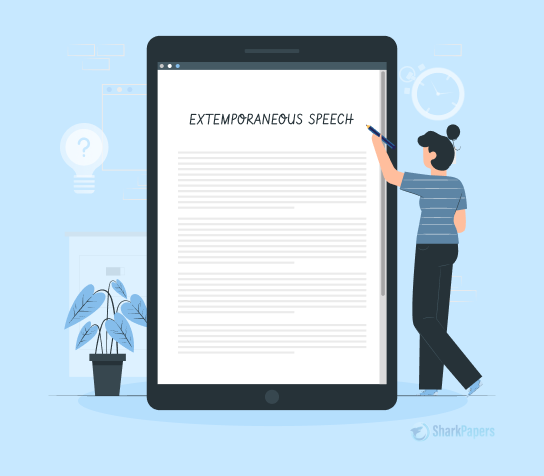
People Also Read
- 500 word essay
- scholarship essay
- autobiography vs biography
- college application essay
- press release
Burdened With Assignments?

Advertisement
© 2024 - All rights reserved
2000+ SATISFIED STUDENTS
95% Satisfaction RATE
30 Days Money Back GUARANTEE
95% Success RATE
Privacy Policy | Terms & Conditions | Contact Us
© 2021 SharkPapers.com(Powered By sharkpapers.com). All rights reserved.
© 2022 Sharkpapers.com. All rights reserved.
LOGIN TO YOUR ACCOUNT
SIGN UP TO YOUR ACCOUNT
- Your phone no.
- Confirm Password
- I have read Privacy Policy and agree to the Terms and Conditions .
FORGOT PASSWORD
- SEND PASSWORD
Westside Toastmasters is located in Los Angeles and Santa Monica, California
How to write ceremonial speeches.

Whether you're there to introduce, dedicate or accept, your ceremonial speech should leave no doubt as to why you and your audience have gathered.
It's your big moment. The spotlight shines on you as you step to the lectern. Whether you are introducing someone to an audience, dedicating something or accepting an award, all eyes are fixed on you and all ears are ready to hear your magic words. How do you prepare for a moment like this?
Writing good ceremonial speeches is tough, partly because your goals are uncertain.
The audience expects you to say: "It's a pleasure to introduce ... ," "I dedicate ... " or "I accept ... " But still, what is your speech supposed to accomplish? And how do you link it to the audience's concerns? And hold their interests? Here are some ways that can help you give creative ceremonial speeches:
Introductions (Also Tributes And Testimonials)
Your introduction should:
- Give the audience a sense of the speaker's topic.
- Familiarize the audience with the speaker's personality and accomplishments, especially those that are relevant to the topic.
- Create a sense of anticipation for both the speaker and the topic.
General principles:
Keep it short. Speak for one to three minutes, depending on how well your audience already knows the speaker. Resist the temptation to list all of the speaker's accomplishments.
Finesse the obvious. If important biographical details are already familiar to most of the audience, preface them with "As we all know ... " or some similar expression.
Be relentlessly positive. Never miss a chance to sincerely compliment the speaker. Make sure your introduction contains nothing that may be derogatory, condescending or uncomplimentary. Humorous anecdotes are fine as long as they reflect positively on the speaker.
Strategies for beginning your introduction:
Use a quote. Look for a gem of a quote about your speaker; use it as a springboard for the rest of your introduction. "One year and 11 days ago, the man who is our guest speaker this afternoon, Bob Jones, became Chief Executive Officer of XYZ Corp. The New York Times called him 'one of the most versatile and multi-talented executives to reach the company's top office.' It's not difficult to see why the paper came to that conclusion."
From general to specific. Begin with the speaker's organization, cause or topic. Tell the audience what it is and why it's important. Then move into your discussion of the speaker.
Birthdays and birth-mates. Check Chase's Calendar of Events (published annually by McGraw-Hill) or go on the Internet to readily see who has the same birthday as your speaker. You may find that the speaker has something else in common with his or her "birth-mate."
Conference theme. If your speaker is part of a program or conference, begin with some comments on the theme of the conference, then tie the speaker's remarks to it.
Ultimate impact. Begin with the ultimate impact of the speaker's organization, cause or key concern. What would society be like if the organization realized its mission? Why (if it's not obvious) would that be a good thing? Then talk about the speaker who's going to help make it all happen.
Business connection. Is the speaker's business tied in some way to that of your organization or company? Is it a longtime client? Supplier? Partner in success? What has the relationship meant to you?
"And he was so right!" Did any of your speaker's philosophies, positions or policies turn out to be correct - or even prophetic? Which one? And how?
Speaker/introducer connection. Perhaps you and the speaker have something in common (hobbies, career progress/events, travel, birthplace, business/political philosophy). What does that say about both of you? Why is it of interest to the audience?
After your opening, you can organize the rest in one of two ways:
1. Enumerate the positives. Make each of the speaker's virtues the topic sentence of a paragraph. Then fill the rest of the paragraph with biographical or anecdotal material that demonstrates the validity of the topic sentence. For example:
[Characteristic] "Ross Perot is a triumphant entrepreneur in the best of the American tradition ... [Illustrations] from his humble beginnings in Texas, delivering newspapers on horseback ... to the presidency of his class at the U.S. Naval Academy ... to an exceptional sales career at IBM ... to the founding of his own company, EDS."
The more important the characteristic, the more time you should spend on it.
2. Biography, then personality. First give the highlights of your speaker's life and career, then talk about him or her as a person. Make a clear transition between the two. "Well, so much for what our speaker is. Now what can I tell you about who he is?" Put the personal part last, as if to say, "This is what's really important."
Summarize and build to a climax.
The ending is key. It must build to a climax. It should summarize the speaker's strengths, virtues and accomplishments and ideally, raise the listeners' sense of anticipation to the point where they just can't wait for the speech to begin.
"What it all comes down to is that John Sawhill represents that all-too-rare combination of thinker, doer and leader, and this - plus all of his expertise and experience in energy and the environment - makes him practically a natural resource unto himself! Ladies and gentlemen ... the President and CEO of The Nature Conservancy ... Dr. John C. Sawhill."
Perhaps there's a quote that reveals how important those strengths and accomplishments are.
"There's an old proverb that says, 'If you wish to know what a man is, place him in authority.' Well, as Bob Jones has risen from one level to the next, we've seen exactly what he is. He is a superb business manager. And he is an enthusiastic, confident leader who understands the dynamics of a tightly competitive, global industry - and knows how to be successful in it."
Stretch out that final sentence with the speaker's full name and full title, and if appropriate, a personal side: "Please join me in welcoming ... the President and Chief Operating Officer of XYZ Corp ... and a man I'm proud to call my colleague and friend ... Robert L. Jones."
The last sentence of your introduction should contain a clear applause sign for example, "Please join me in welcoming ... " or "It's a pleasure to welcome ...." For variations, listen to the way entertainers introduce people. These are the formulas that your audience expects to hear.
Dedications And Commemorations
This category includes welcoming remarks; dedications of buildings, monuments and other facilities; and groundbreakings, ribbon-cuttings, unveilings, anniversaries, commemorations and other milestones (such as the millionth product to come off an assembly line).
Be specific about what you're celebrating. "So today, we dedicate this marker to Walter Chrysler ... to his vision of building 'one carriage in as nearly perfect a manner as possible' ... and the millions of outstanding Chryslers and, more important, to the people of Chrysler who have made that vision a reality."
Global view. Explain how what you're dedicating or commemorating fits in with or fulfills some larger plan - or accomplishes some ultimate goal.
Talk symbolically. What does the thing you're celebrating stand for? What is its larger meaning? "This facility symbolizes the synergy of traditional manufacturing and modem systems engineering ... the spirit of innovation that runs deep in both of our organizations ... and the progress that we've made and will continue to make together."
New facility, same people. If you're dedicating a new facility staffed by current employees, focus on them. Credit them for achievements in the old facility - or for what they've accomplished so far in the new one. Talk about what has (or has not) changed. This very effective approach enables you to show familiarity - and thus to bond - with your audience, but it must be executed with care.
Award Acceptances
You're being honored. The award citation may be downright lavish in its praise, so show modesty, emotion and appreciation for the organization.
Show modesty. You can quote someone on modesty or humility: "At moments like this, remember a piece of advice from Golda Meir: 'Don't be so humble,' she said. 'You're not that great.' Or find someone else to share the glory with, whoever did the real nuts-and-bolts work or whoever helped make you worthy of the award. "I accept, with pleasure and gratitude ... not just for myself, but also on behalf of all the true leaders in my company and throughout American business and industry - in recognition of all that they have done to maintain the conscience of our corporations and to promote human dignity and social justice."
Talk about the cause. If the award represents excellence or achievement in or advancement of a cause, offer perspective on that cause. How is it faring? Where should it go from here?
Interpret the event; praise the values. What are we really doing here? Why is the award important and what values does it reflect? If possible, link those values to current events, to demonstrate their undying relevance. "What we're doing here today is more than an awards ceremony, as enjoyable as that is ... and more than a fund-raising event. By singling out Good Scouts, we send a message that 'this is the kind of society we want to have' - a society that respects individual achievement and takes pride in the values associated with Scouting itself."
Historical precedent. Look at the history of the organization or its cause. Have others, perhaps in the early days, had the feelings, thoughts and ideas that you and the audience are now sharing? Try to create a connection between past and present.
End by thanking the organization again. Show positive emotion such as hope for the continuing success of the organization and its causes. "Let me close by thanking you once again for this award. I accept it with the hope that someday brotherhood and sisterhood will need no publicity ... that someday a 'humanitarian award' will be just as superfluous as an award for getting up each morning."
The Golden Rule Of Ceremonial Speech Writing
All effective ceremonial speeches have one thing in common: They interpret the event.
The traditional marriage ceremony begins with "we are gathered together to unite this man and this woman in holy matrimony." It comes right to the point. Similarly, whether you're there to introduce, dedicate or accept, your ceremonial speech should leave no doubt as to why you and your audience have gathered. It should tell the listeners what thoughts and feelings are appropriate to such a meeting. It should leave them with an understanding of the larger meaning of the ceremony. If you can do that, your ceremonial speech will transcend platitudes and have real meaning. Your listeners' lives will be different because they have heard your magic words.
By Alan _ Parlman
View articles on similar topics
Westside toastmasters on meetup.

Commemorative Speech Inspires Listeners To Celebrate And Remember

A commemorative speech honors or celebrates a person, event, or occasion. They might remember someone who has died or mark a birthday, anniversary, founding, or history of achievements. The speech should inspire listeners to reflect and feel pride, gratitude, or loss.
In public speaking, a commemorative speech pays tribute to a person, a group, an institution, an event, or an idea. It’s also known as a ceremonial speech or epideictic speech.
Table of Contents
What Is A Commemorative Speech?
Specific types of commemorative speeches honor a particular time of life. There are different types of commemorative speeches, such as a eulogy (a speech delivered at the funeral or memorial services of a deceased loved one), a graduation speech, and an award acceptance speech.
In speech writing, people also consider a tribute speech that highlights the achievements of a person, a group, or an organization and a farewell speech given when someone leaves a community or institution) as a commemorative speech.
Any special occasion speech (e.g., wedding toasts, anniversary speeches, and retirement remarks) that focuses on celebrating the significance of an event is also a type of commemorative or ceremonial speech.
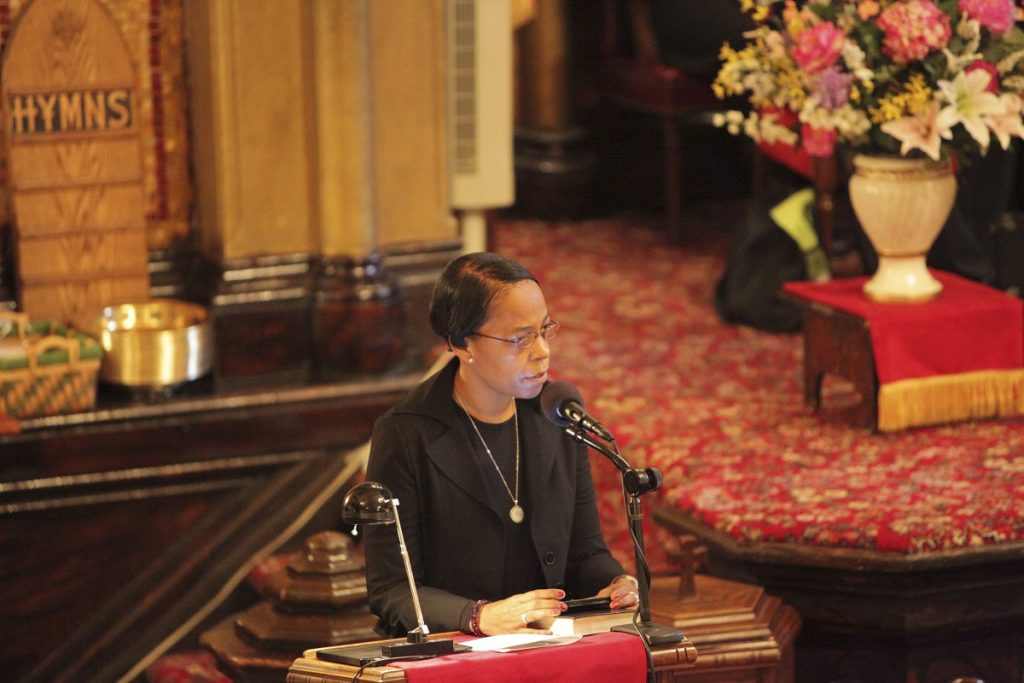
What Is The Goal Of A Commemorative Speech?
Each type of speech has a specific purpose. An informative speech informs the audience about a particular topic, while a persuasive speech convinces others to support a certain viewpoint. A motivational speech inspires others to change something in their lives. On the other hand, a good commemorative speech aims to honor and pay homage to a person, event, or idea.
While it may contain elements of informative, persuasive, and motivational speeches, the ultimate goal of a commemorative speech is to create a strong sense of appreciation. It shines the spotlight on human values, evoking positive emotions and inviting the audience members to reflect.
For example, in his speech on the 20th anniversary of the 9/11 attacks , U.S. President George W. Bush emphasized human courage as he honored the gallantry of American soldiers who volunteered to serve after the terroristic act.
A part of his speech went, “These Americans were brave, strong, and united in ways that shocked the terrorists – but should not surprise any of us. This is the nation we know. And whenever we need hope and inspiration, we can look to the skies and remember.”
What Should Be Included In A Commemorative Speech?
As with other speeches, a commemorative speech mainly has three parts. It has an intro where you give a hook that will attract the audience’s attention, and you present the topic and purpose of your speech.
In the body, you celebrate the values exemplified and achievements reached by the person or group you’re commemorating. If you’re honoring an event, this is where you showcase the importance of the said event, the key players behind it, and the lessons the audience must learn from it.
The conclusion is a summary of your major points. It’s also an opportunity to emphasize how the subject will influence the present and the future.
In the rest of the speech, there are certain elements that you can incorporate to make the commemorative speech more effective. You can add a personal touch and connection (e.g., share your personal relationship with or experience about the subject) to add a strong sense of authenticity to your narrative.
Apart from the key qualities and accomplishments of the subject, you can inject personal observations to add depth to your speech. You can also use figurative language and imagery to enhance the emotional appeal of your piece and paint a more compelling picture.
When writing a commemorative speech, the bottom line is to write from the heart — without sacrificing the accuracy and truthfulness of your piece.
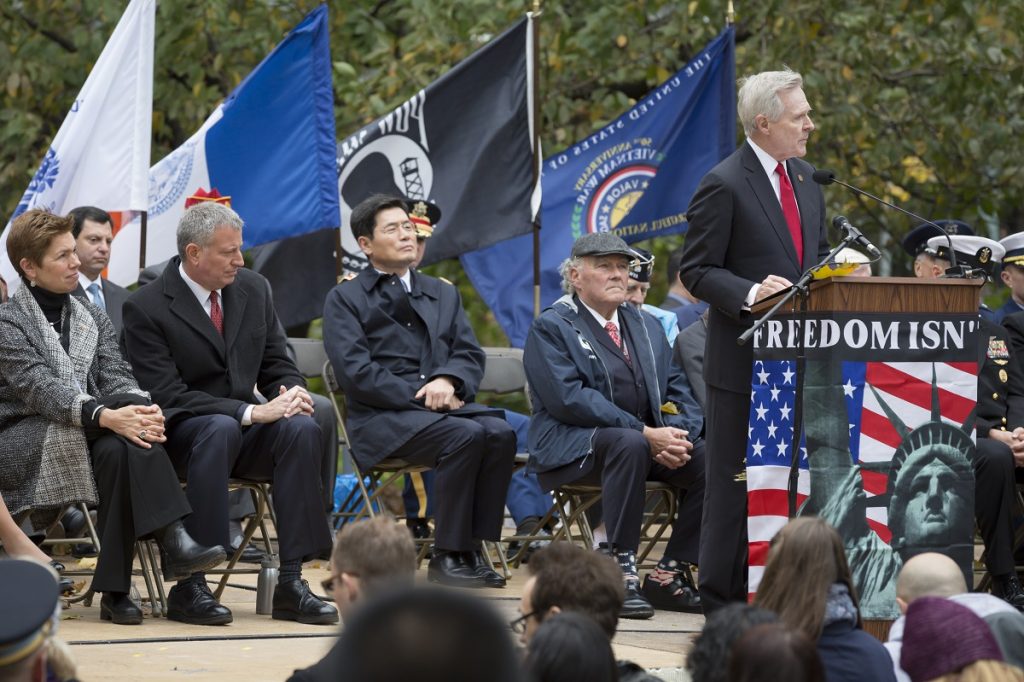
What Is A Commemorative Speech Outline?
Is it your first time crafting this kind of speech? Here’s a commemorative speech outline template that can serve as your guide.
- Attention statement
- Thesis statement
- Relevance of the topic to your audience
- Preview of your main points and
- Main points with subject statement
- Illustration (examples, supporting stories)
- Summary of ma i n points
- Thesis statement emphasis
- Closing statement
What Are Some Commemorative Speech Topics?
Look around, observe, and you’ll see several human values, people, and events worth commemorating. But if you’re stuck and can’t seem to find commemorative speech topics to talk about, here are some commemorative speech ideas to spark inspiration (You can also use this list when you brainstorm with your peers).
- A tribute to outstanding figures throughout history (e.g., Neil Armstrong, Martin Luther King, Abraham Lincoln, Marie Curie, Meryl Streep)
- A celebration of significant events and movements (e.g., the end of World War II, the dawn of the Internet, Independence Day, civil rights movement)
- A commemoration of your own achievements (e.g., the day you landed your dream job, your wedding anniversary, the first book you published)
- A homage to the people around you and who touched your life (e.g., your parents or any other family member, your trusted mentor, your favorite high school teacher, the dedicated police officer in your neighborhood)
- A spotlight on human values (e.g., human resilience during the pandemic, creativity, loyalty)

How Do You Start A Commemorative Speech Example?
The most effective commemorative speeches have one thing in common: a memorable intro. If you want to write or deliver a truly inspiring commemorative speech, spark audience interest in the first sentence or two.
One of the best ways to start a commemorative speech is to recount a story or an anecdote. Note that our brains are hardwired to be interested in stories. So telling one to open your speech will help capture your audience’s attention.
You can also use a relevant quote, metaphor, or figure of speech. Another way is to ask the crowd a relevant question . As with other types of speech, you can also begin with an interesting fact or statistic, a hypothetical scenario (“what if,” “imagine”), a recollection, or a really bold statement.
Going back to President Bush’s 9/11 anniversary speech, this was how he commenced his piece — through a recollection of the past: “Twenty years ago, we all found — in different ways, in different places, but all at the same moment — that our lives would be changed forever. The world was loud with carnage and sirens and then quiet with missing voices that would never be heard again. These lives remain precious to our country and infinitely precious to many of you. Today we remember your loss, we share your sorrow, and we honor the men and women you have loved so long and so well.”
What Is An Example Of A Commemorative Speech?
[Note to Editor – Copyscape hits because of the snippet below]
You can find several commemorative speech examples on the web. One of the best speech examples was President Lyndon B. Johnson’s “Great Society” speech , which he delivered at a University of Michigan graduation ceremony in 1964.
Here’s a snippet:
“For a century, we labored to settle and to subdue a continent. For half a century, we called upon unbounded invention and untiring industry to create an order of plenty for all of our people.
The challenge of the next half century is whether we have the wisdom to use that wealth to enrich and elevate our national life and to advance the quality of our American civilization.
Your imagination, your initiative, and your indignation will determine whether we build a society where progress is the servant of our needs or a society where old values and new visions are buried under unbridled growth. In your time, we have the opportunity to move not only toward the rich society and the powerful society but upward toward the Great Society.
The Great Society rests on abundance and liberty for all. It demands an end to poverty and racial injustice, to which we are totally committed in our time. But that is just the beginning.”
Recent Posts
Active Listening Absorbs The Whole Message, Not Just The Words
Active listening goes beyond hearing the words someone is saying to you and understanding the message they are conveying. Many only hear a small percentage of what is being said as they are...
Counteracting Fear Of Public Speaking With Coaching And Therapy
Nearly 75% of people experience the social phobia of fear of public speaking. The result may be nervousness before speaking or a full-blown panic attack. Practicing public speaking may lessen the...
- Speech Crafting →
Preparation: How to write a Speech Outline (with Examples)

You have been chosen to give a speech on a particular topic and you reckon that you’re a good speech writer.
However, without a good speech outline, your speech lacks the proper skeleton to put meat on.
A speech outline is to a speech what a blueprint is to an unconstructed building.
So, how do you develop a good speech outline? First, break it down into small steps as this will make it easier for you to prioritize your ideas and organize them in the right order before you add more details to them.
How to Make an Outline for a Speech
Below are steps that will enable you to write an effective speech outline for your presentation.
You should start by asking yourself:
a) What is the big picture?
Before you begin writing your outline, you should take a step back and think about your speech as a whole.
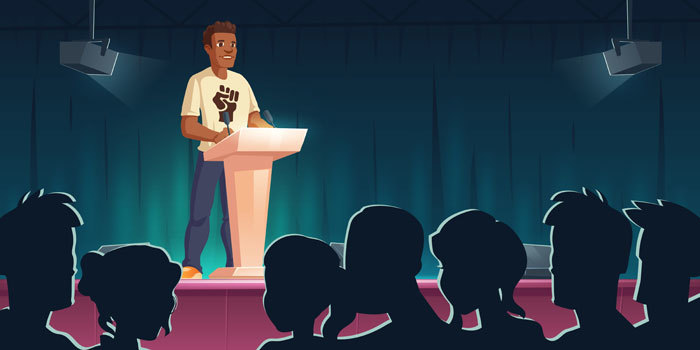
First, think about the 3 keystones for your presentation or speech, i.e. the audience, your subject matter and of course, you, as the speaker.
Then, write a few notes down about each keystone and how they relate with each other. For instance,
- With regard to your presentation’s subject matter and the audience, what does the audience know about the subject? Do they find the subject interesting or not at all? Is the subject relevant to them?
- What do you as the speaker know about the subject in question? What are the reasons behind your presentation? Do you have any expertise on the matter? What new information will you be sharing with your audience?
A good outline will help you engage with your audience in a way that not only captures their attention but enables them to understand the subject matter.
b) What is your objective?
This refers to the goal of your presentation. Here, you should ask yourself, what do you want your audience to do after your presentation is over?

While the objective for most speakers is for their audience to know something, that may not be enough. The best presentations and speeches are those that move people to act.
If you would prefer to make an impact in such a way, then you should ensure that you are as specific as you can be when deciding on your objective in your speech outline.
c) What is your message?
Your message is what holds your presentation or speech together. This is not to mean that you shouldn’t have different parts in your speech, but it does mean that your speech should have one message that you are trying to put across.

Trying to include several different messages in your speech may confuse your audience, which makes it harder for them to understand the main point you are trying to convey.
To do this, summarize the message of your presentation in one statement. This will not only allow you to understand the message in its entirety but also allow you to explain the message to your audience in a way that is easy to understand.
You can now use the statement you wrote above to help you develop your speech outline. Using the statement to determine whether a certain point supports your main message will ensure that your speech flows and doesn’t include any information not relevant to your subject topic.
d) How is your presentation relevant?
When it comes to a presentation or speech, the audience should always come first. That is why as a speaker, you should always keep your audience in mind when presenting.
If you have already decided on the message you will be conveying to your audience, you should now ask yourself; how is your message relevant to the audience?

If you can’t come up with a reason why your presentation is relevant, then it’s back to the drawing board for you. This could mean that you will be presenting to the wrong audience or you will be giving the wrong presentation.
You can refer back to step (c) then review steps (a) and (b) for clarity.
e) Your speech structure
This is a very important part of your presentation as without it, your speech will have no impact on the audience. Therefore, you should ensure that you include the speech structure in your speech outline.
A structure has 3 basic parts; the introduction, the body and the conclusion. It should be noted though that when working on your speech outline, a common suggestion is to begin with the body before developing both your introduction and conclusion.

Under your speech structure, the introduction is the opening of your speech/presentation. To make a good first impression on your audience, ensure that your introduction is strong.
This doesn’t have to be the usual, “Good morning, my name is YXZ…” Instead, capture your audience’s attention by either telling a story or an interesting fact, recite a quote, ask your audience to recall or imagine something or even ask a rhetorical question!
Related: How to Start a Speech to Engage Your Audience
The body of your presentation represents the bulk of your speech. You should therefore ensure that your main points can be explained in detail and that they have been organized in a logical order that makes your message easy to comprehend.
Similar to your introduction, you should finish on a strong note when it comes to your conclusion. You can do this by linking your conclusion to your introduction, after which you can then echo and summarize your message’s main points.
Different Speech Outline Examples
Below are a few examples of different speech outlines that you can use as a basis to write your own outline. Choosing the right one that works for you may depend on the type of speech you will be giving .
1. Persuasive Speech Outline
Persuasive presentations and speeches usually have a specific purpose in mind; either to urge the audience to take action on something or persuade them to adopt a certain view or opinion of something.

This type of outline allows you, the speaker, to focus on the subject matter point while arguing your case in the most effective and compelling way to your audience.
A persuasive speech outline is made up of these parts:
- An introduction
- The conclusion
- Source Citation
The first three parts are common in most if not all presentations; please refer to step (e) to familiarize yourself with them once more.
A source citation is simply citing the sources for the research and facts that you presented in your speech. Remember you are trying to persuade your audience, so authoritative sources add weight to your argument.
2. Informative Speech Outline
There are different types of informative outlines. These include:
- The informative speech outline
- The informative presentation outline
- The informative essay outline
These outlines are made up of 3 basic parts; the introduction, body and conclusion. For purposes of this article, we will be discussing the informative speech outline.
The central objective of an informative speech is to offer unique, useful and interesting information to your audience. Before choosing your informative speech topic , you should consider your overall objective.

Additionally, there are various types of informative speeches , including:
- Concept - These are used to discuss abstract ideas like ideas and theories.
- Process - These are used when describing broad processes.
- Event - These are used to explain things that may happen, are already happening or those that have happened already.
- Object - These are used when talking about products, places or people.
In addition to this, there are patterns that can be used to organize your speech outline. These will be chosen depending on your speech type.
Types of these patterns include:
- Chronological or sequential - This pattern deals with a sequence of events; which could be useful in demonstration speeches or when discussing historical topics
- Spatial or geographic - Use this pattern when discussing topics that deal with physical spaces
- Logical - This pattern is suitable for a broad topic that has been broken down into sub-topics.
- Advantage-disadvantage - This pattern can be used when you will be examining a range of negative and positive aspects of an event or idea
Furthermore, there are 2 possibilities for preparing a speech outline; the speaking and preparation outline.
The speaking outlines make use of phrases and keywords, which helps keep you focused on the subject matter while the preparation outline is used to help you develop your speech and makes use of full sentences.
3. Demonstrative Speech Outline
A demonstrative speech is an instructional speech that teaches the audience something by demonstrating the process.

Here are the basic steps for a demonstrative speech:
- Ask yourself why you choose this topic and why it is important to the audience
- Provide an overview
- Explain the steps involved in your process
- Talk about variations, other options
- Ensure you allot time for Q&A
- Give a brief summary
For a more in-depth guide on writing demonstrative speeches, click here .
Pro-Tip: Write down the specific purpose of your speech and your topic of discussion as you formulate your generic speech outline.
Conclusion: On Speech Outline Formats
As you become better at writing and delivering speeches, you will soon learn that the different outline formats described above aren’t mutually exclusive. Rather, situations often make it necessary to mix different formats.
What are you waiting for? Go out there and grow your confidence as a speech writer and speaker!
- Games, topic printables & more
- The 4 main speech types
- Example speeches
- Commemorative
- Declamation
- Demonstration
- Informative
- Introduction
- Student Council
- Speech topics
- Poems to read aloud
- How to write a speech
- Using props/visual aids
- Acute anxiety help
- Breathing exercises
- Letting go - free e-course
- Using self-hypnosis
- Delivery overview
- 4 modes of delivery
- How to make cue cards
- How to read a speech
- 9 vocal aspects
- Vocal variety
- Diction/articulation
- Pronunciation
- Speaking rate
- How to use pauses
- Eye contact
- Body language
- Voice image
- Voice health
- Public speaking activities and games
- About me/contact
- Tribute speech guide
Tribute speech guide
- how to prepare a sincere commemorative speech.
By: Susan Dugdale | Last modified: 04-18-2021
A tribute speech belongs in a special category of speeches called commemorative. Its principal purpose is to inspire and celebrate; uniting listeners in sincere, heartfelt gratitude and admiration for its subject.
Have you been asked to prepare a tribute speech and need to know more?

What you'll find on this page
- what occasions are most likely to call for a tribute speech
- the characteristics of a tribute speech
- how to begin the process of writing a tribute speech
- how to choose a topic
- information about eulogies or funeral speeches, (a special type of tribute speech), with links to examples.
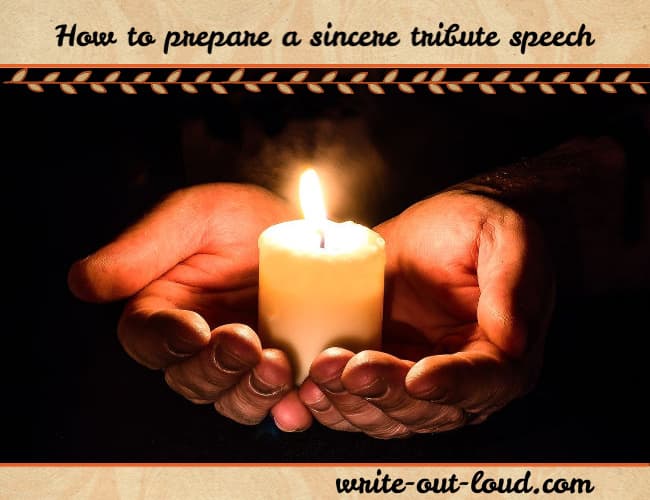
What occasions call for a tribute speech?
A tribute speech may be delivered at any of the following celebrations:
Anniversaries
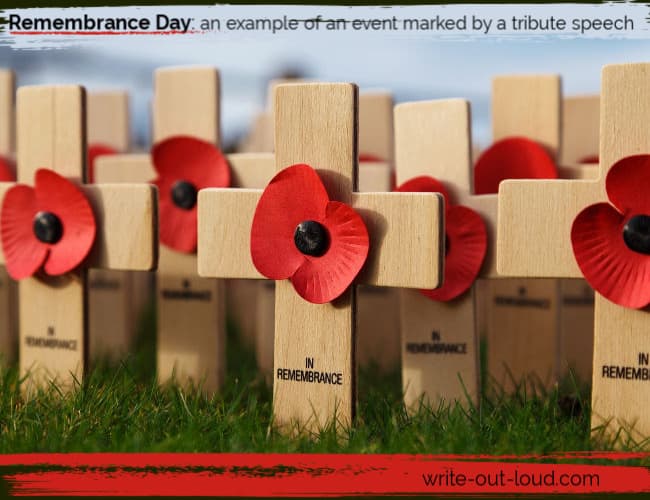
These may be family events for example; a 50th wedding anniversary or a milestone birthday , or they could be public ones, for example; celebrations marking historic events like Remembrance Day or, the passing of a famous person.
At a family reunion this form of speech may be given to honor its senior members.
Similarly it will be an important part of the reunions of people brought together by work, sport, interests or vocation.
Memorial services or funerals
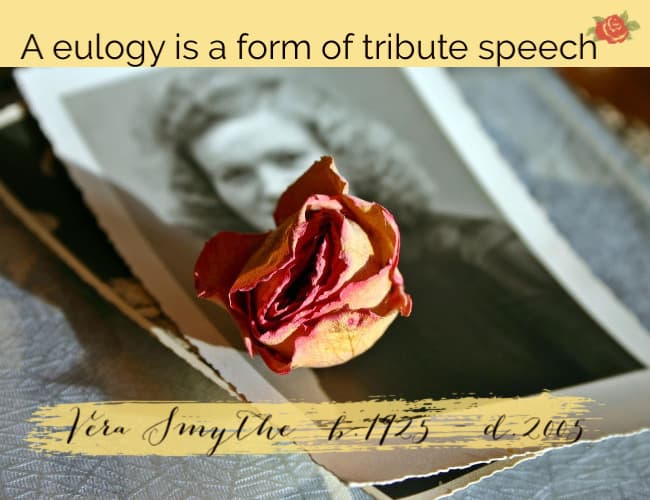
The eulogy you hear at a memorial service or funeral is a special type of tribute speech celebrating the life of the person who has passed away.
A tribute speech at an award presentation will honor the achievements of the award recipients. For example film, music or sports awards.
Although thought of as 'wedding speeches', the best man, father-of-the-bride speeches and their variations, are all forms of tribute speeches.
Retirements
The tribute speech heard at a retirement celebration honors the retiree by acknowledging their service and contribution.
The characteristics of the speech
Whether the focus is a person, or an event involving a group of people, its characteristics are:
- admiration and respect
- a focus on positive qualities: perseverance, dedication, humility, compassion, honesty, trustworthiness, loyalty, sacrifice, service, kindness, humor ...
- highlighting accomplishments and the difficulties overcome to achieve them
- a reflection on the positive impact and contribution of the focal group or person on the lives of others
- grateful acknowledgment of what we can learn from their example to take into the future
How to begin writing a tribute speech
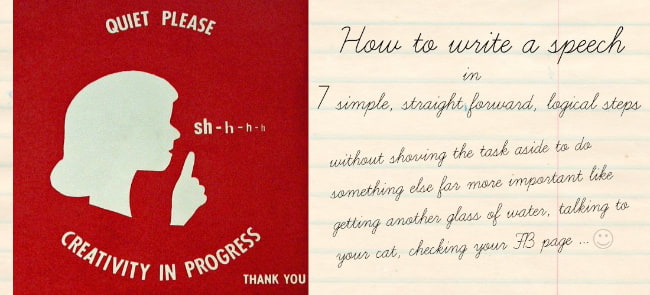
The first step in your process is finding out as much as you can about the occasion itself and then deciding on a topic, (if it hasn't already been decided for you).
You'll want to know:
- who the audience is
- whether you are the only speaker, or one in a series of speakers
- how long you expected to speak for
- whether the event is formal or informal
- if there are any special requirements the organizers may have that need to be included in your speech
How to choose a topic
Generally the occasion chooses it for you! If you're asked to speak at the celebration marking your Mother's 70th birthday or a similar event, then you know what the central topic is.
What you'll need to decide is how to handle it or what angle to take.
Get some help to find the right topic
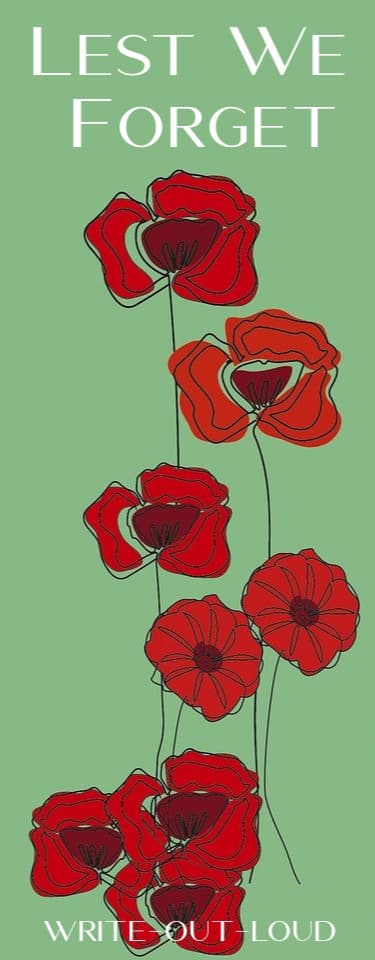
If it's not clear what you should talk about, you'll find this page on how to select an inspiring tribute or commemorative speech topic helpful.
It walks you step by step through the process of finding a topic to suit your audience's needs and has a great selection of carefully picked links to help you research topic possibilities.
Get some help with planning and writing
There's a tribute speech template here that will be useful to help you plan the sections of your speech. Use it as a guide.
(On the same page is a speech I wrote to honor my Mother. It follows the template.)

Or if you'd like more than an outline to help you, you'll find the entire process of writing a speech mapped out step by step here: how to write a speech .
Are you here because you need to prepare a eulogy?

These links below will guide you through the process:
- How to write a eulogy Step by step guidance for preparing, writing and delivering a eulogy with a free printable eulogy planner.
- And if you'd like to include a special verse or quotation browse these pages of funeral poems and inspirational quotations .
Would you like to read a sample eulogy before you begin?
Reading others can be really useful in helping you decide what you want to achieve with your own speech.
Well known tribute speeches
Here are three famous speeches, each illustrating the characteristics of a fine commemorative speech.

- Ronald Reagan's tribute for the crew of the Challenger Space Shuttle that exploded during its launch.
- Sen. Edward Kennedy's eulogy for his slain brother: Robert F. Kennedy .
- Oprah Winfrey's eulogy for Rosa Parks .
Not-so well known tribute speeches
I am very fortunate to have a collection of not-so famous tribute speeches on write-out-loud.com.
These are very special because they're by people probably similar to yourself who have been asked to write a speech about someone they've loved dearly.
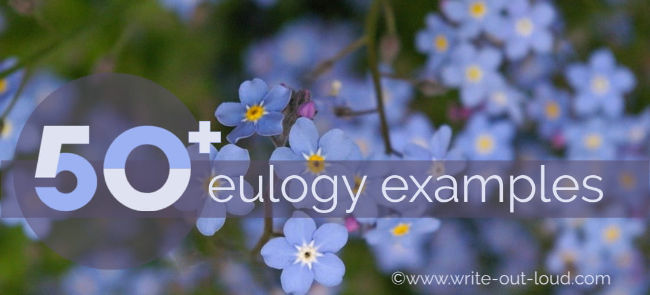
There are eulogies for mothers, fathers, sons, daughters, cousins, aunts, uncles, grandparents, colleagues, and friends.
All of them have been sent in to provide examples to help people who are trying to write. Seeing how others have handled the task gives them the courage and confidence to begin.
These eulogy pages get thousands of visitors every week.
And lastly, here is that link to the commemorative speech for my mother.
Do you need help with preparing to deliver your speech?
You'll find everything you need to help you give your speech confidently by visiting the site map .
There's tips on making and using cue cards , how to overcome fear or anxiety of public speaking , how use your voice well , and more.
If you're struggling for words you may like this offer ...

- Return to top of page
- Return to write-out-loud.com homepage
speaking out loud
Subscribe for FREE weekly alerts about what's new For more see speaking out loud

Top 10 popular pages
- Welcome speech
- Demonstration speech topics
- Impromptu speech topic cards
- Thank you quotes
- Impromptu public speaking topics
- Farewell speeches
- Phrases for welcome speeches
- Student council speeches
- Free sample eulogies
From fear to fun in 28 ways
A complete one stop resource to scuttle fear in the best of all possible ways - with laughter.

Useful pages
- Search this site
- About me & Contact
- Blogging Aloud
- Free e-course
- Privacy policy
©Copyright 2006-24 www.write-out-loud.com
Designed and built by Clickstream Designs

Ceremonial Speech

What is the first thing that comes to mind when you say the word ceremony? Normally, people would assume weddings, graduations, and recognition ceremonies. And they are not wrong. But there are different types of ceremonies for many different types of occasions, not only limited to the aforementioned events above. You may also see introduction speech .
- Narrative Speech Examples
- Business Speech Examples
What is a Ceremonial Speech?
According to Michael Gamble, one of the proponents of the book Public Speaking in the Age of Diversity , he points out that ceremonial speaking stresses the sharing of identities and values that unite people into communities. It can be said that all societies hold certain values central to human existence: beauty, loyalty, wisdom, kindness, tradition, success, innocence, experience, courage, perseverance, kindness, for instance. You may also see thank you speech .
Just like commemorative speeches, this kind of speech is “epideictic”. Events such as the eulogy, the speech of nomination, the speech of goodwill, the wedding toast, and the award acceptance speech are considered special occasions on which we celebrate and reinforce common aims, benefits, and aspirations. You may also see welcome speech .
“In many ways, special occasions are the punctuation marks of life. They are the rituals that draw us together in celebration of some person or event” Gamble (p. 385)
People gain appreciation of themselves through appreciation of their common heritage. Ceremonial speeches are not simply informative, they are the the reason on why we celebrate these events in the first place. Think of it as a thank you note in a very formal way. You may also see how to write an appreciation speech .
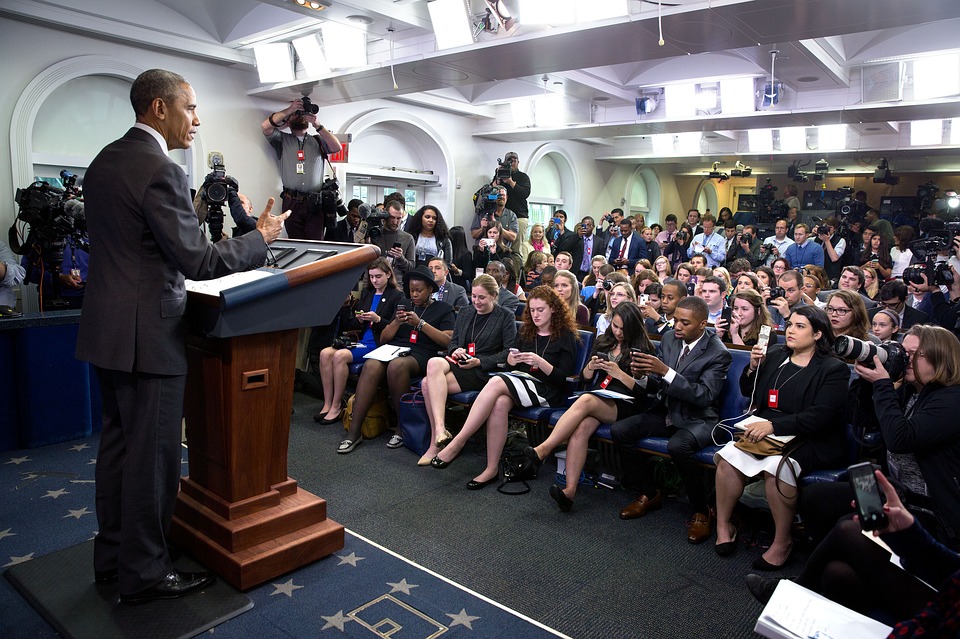
Types of Ceremonial Speeches
Ceremonial speeches are not only limited to weddings and graduations. There are in fact a numerous kinds of ceremonial speeches. Here are some of them listed below based on the book Public Speaking in the Age of Diversit y:
1. The Speeches of Introduction
Yes, even introduction speeches can act as a form of ceremonial speech. But the goal of of the introductory speech must be kept brief and concise as this is not about you, but about the speaker and the topic he or she is going to be delivering. To do so, you must first establish the nature of the occasion followed by enhancing the speaker’s credibility by giving the audience a bit of a background check and finally, it is important to persuade the members of the audience to focus on the speech’s content. You may also see speech examples .
2. The Speech of Presentation
This kind of speech is normally done before the person or team accepts the award. In the annual Academy Awards, there are at least 24 awards in total ranging from Best Director to Best Actor or Actress, or from Best Sound Editing to Best Original Screenplay. Before the host or hostess awards the person or team, he or she summarizes the purpose of the award, and discusses the accomplishments of the person or team being honored. You may also see special occasion speech .
3. The Speech of Acceptance of an Award
Every winner of an Oscar has something different to say as they accept their speech. When Leonardo DiCaprio finally won his in 2016, he had already written a speech beforehand anticipating that he was going to win. The moment you walk up on that stage to receive your award, it is important to thank, recognize and give credit to those who have helped you perform your best and who have raised you up to the person you are today. You may also see tribute speech .
As you accept the award graciously with humility, try to ponder on the values represented by the award and explain how much it means to you, to be standing there on the stage with a golden statuette on your hand. Mahersala Ali, the winner of Best Supporting Actor for the movie Moonlight last year, became the first Muslim actor to win an Oscar in the history of the Academy Awards. He drafted his speech that was not about him, but about the real-life characters portrayed in Barry Jenkins’ drama. You may also see self introduction speech .
“And one thing that they consistently told me is – [his teachers] Oliver Chandler, Ron Van Lieu, Ken Washington – is that it wasn’t about you. It’s not about you. It’s about these characters. You’re in service to these stories, to these characters. I’m so blessed to have had an opportunity. It was about Juan. It was about Chiron. It was about Paula,” Mahersala Ali
4. The Commencement Address
Whether it will be the valedictorian or the school chairman delivering the address, it is always important to praise and congratulate the graduating class. You then begin to acknowledge on how the graduates and members of the audience (e.g. parents, teachers, friends) have become a huge factor to where they are today. It is important that you encourage the graduates to hold their heads up high and look towards the bright future they are about to carve for themselves. You may also see farewell speech .
5. The Keynote Address
In delivering the keynote address, try your best to allow the audience to focus on the common goals you would like for them to achieve. In doing so, communicate the central focus of those gathered there by setting a tone that arouses interest and encourage commitment. You may also see wedding speech .

6. The Speech of Tribute
Tribute Speeches are just like eulogies, except the person who you are talking about is not dead. He or she is very much alive and well. People would usually decide to say their true feelings about the person when they are gone, and not alive. If you have seen the movie The Fault In Our Stars , Hazel Grace Lancaster decides to give a “eulogy” to her very much alive boyfriend at a church, together with his blind friend Isaac. And when he was already six feet below the ground, her speech was not that heartfelt when he was alive. You may also see motivational speech .
Describe what makes the subject of the speech worthy of praise and special recognition. Explain what the subject actually accomplished. Persuade the audience to let the past accomplishments of the person inspire them to adopt the values being recognized to become a better version of themselves. You may also see award speech .
7. The Eulogy (Special Form of Speech of Tribute)
If you had just one final chance to say anything to the person before he or she passed away, what would you have said? By the time, you have said your piece, it would have already been too late. In a eulogy, it is important that you learn to acknowledge the death of the person.You may also see presentation speech .
Make sure that you have said everything that you wanted to say to the person while he was still alive. Even though funerals are often a sad occasion, try to celebrate the life of the deceased by acknowledging the legacy and his achievements to society. Make use of illustrations to underline the uniqueness of subject, bring the group together, and ease the sense of loss. You may also see graduation speech .
8. The After-Dinner Speech
This kind of speech is generally designed to be entertaining and delivered in a lighthearted manner. After-dinner speeches takes a good-natured, sometimes humorous, whimsical, or mildly satirical look at a topic of interest or relevance to audience. Not only must it be easy to digest, but it should establish a mood, convey the message and carry a theme to make the event worthwhile. You may also see orientation speech .
Ceremonial Speeches Example
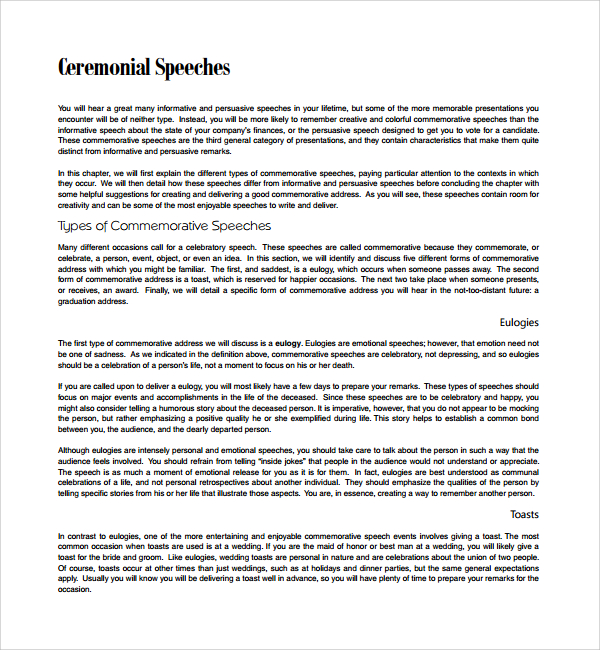
Size: 106 KB
Techniques of Ceremonial Speeches
Michael Osborn, a proponent of the book Public Speaking 2nd editio n, suggested two techniques basic to all forms of ceremonial speeches: Identification and Magnification.
A. Identification
Through identification, this refers to the phenomenon where the speakers develop close feelings between the audience members, and vice versa. There are at least three ways to go about it: 1. Narrative. 2. Recognition of heroes 3. Renewal of group commitment
B. Magnification
By taking a closer look at the person’s significance or perhaps the event itself, we can emphasize certain values on what the event commemorates or perhaps what the person has achieved during his or her life. You may also see leadership speech .
(a) Great obstacles (b) Accomplishments that are unusual (c) Performances that are superior (d) Pure motives (e) Accomplishments that benefit society
2. Tools of language:
(a) Metaphors (b) Similes (c) Anaphora, repeating keywords in a certain order
Tribute Speech Example
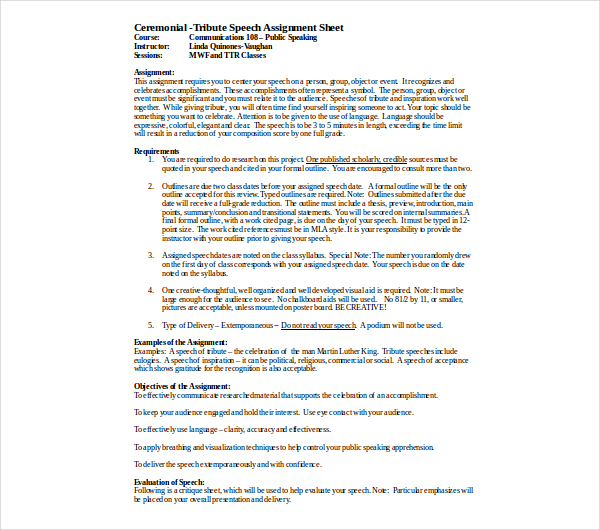
Tips on Ceremonial Speechwriting
In the process of writing your speech, make sure that you have a temporary audience to rate you and critique on your work in order to help you draft your speech better. Delivering a speech can be tricky especially when you accidentally eat your own words as they are caught between tears of sadness. So make sure every word is accounted for. Ask for advice from your editors, teachers, and fellow classmates in terms of structuring, word selection, punctuation, pausing on important points and others. You may also see informative speech .
Think about the person, place, or other thing that is being praised through your speech.
- Can you balance tradition and formality with personal touches within your speech?
- Make sure that your words are respectful: Lots of people will hear this speech, and some might judge you based upon the stories you share and the speech elements you include. You may also see youth speech .
- Write from the heart. It is obvious when you are speaking about something you care very little about.
If you lack the inspiration to write a ceremonial speech, remember to tell yourself this: This is not for me, but this is for my audience or the person I care about. You may also see launch speech examples .
Closing Ceremony Speech Example
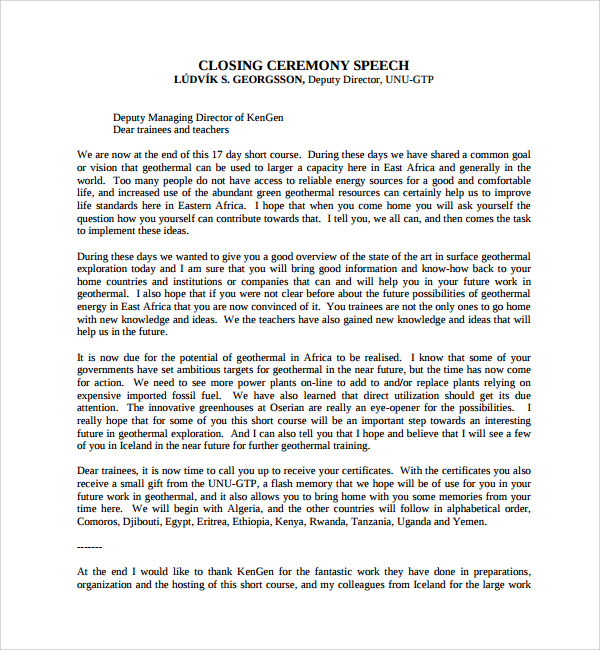
Size: 105 KB
We hope you found our article on ceremonial speeches to be informative as well as helpful when you will be writing your own ceremonial speech. You may also see declamation speech .
Ceremonial Speech Generator
Text prompt
- Instructive
- Professional
Create a Ceremonial Speech for a groundbreaking ceremony.
Write a Ceremonial Speech for an awards gala.
How to Write a Commemorative Speech
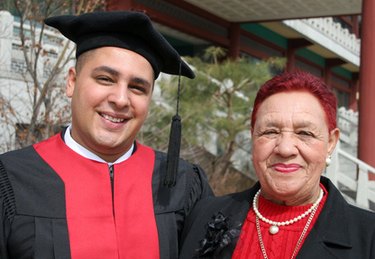
Public speaking can be intimidating. You can reduce the intimidation of public speaking by understanding the different types of speeches, such as informative and persuasive. Commemorative speeches, also called ceremonial speeches, serve as another type of speech. The purpose of commemorative speeches involves honoring a person, place, event or idea. By the end of your speech, your audience should feel a sense of honor, as well as hopefulness for the future.
Advertisement
Define the purpose of your speech. Ceremonial speeches can be given on several occasions, including graduations, weddings (toasts) and funerals (eulogies).
Video of the Day
Familiarize yourself with your audience. You will want to give a speech everyone in your audience can relate to. For example, a graduation speech should cater to friends and family, in addition to graduates.
Write the body of your speech. Content to include in a commemorative speech include admirable characteristics and anecdotes. For instance, if writing a speech about a charitable organization, you can focus on the characteristics of care and selflessness, using a story about one of the helped families to illustrate these values.
Add an introduction which will foreshadow the body of your speech. An important aspect of the introduction involves capturing your audience's attention. Ways to do this includes asking a question, sharing an interesting fact, and establishing a link between your audience and the topic being honored.
Write your speech's conclusion. The conclusion should recap important values and share a hope for the future. To warn your audience your speech is coming to an end, use a concluding transitional phrase. For example, a eulogy's conclusion might read "All in all, Harry lived a life full of passion, care and love. By doing the same we can make the world a better place while keeping the spirit of Harry alive."
Use descriptive language. For instance, demonstrate a life-saving firefighter’s courage by calling the fire he ran into a “raging hot fire.”
Avoid exaggerations. Let the actions of the person, place or event illustrate the reason the subject deserves to be honored. Staying with the same example above, don’t say the flames engulfed the entire building unless the flames really did.
- University of Louisville: Public Speaking
- University of Pittsburgh: Speaking in the Disciplines
Report an Issue
Screenshot loading...
My Speech Class
Public Speaking Tips & Speech Topics
Maid of Honor Speech [What to Say + Outline + Template]

Jim Peterson has over 20 years experience on speech writing. He wrote over 300 free speech topic ideas and how-to guides for any kind of public speaking and speech writing assignments at My Speech Class.
Giving a maid of honor speech is an honor – and also a responsibility.
If you’re invited to be maid of honor at a family member or friend’s wedding, you have a huge role in the wedding ceremony. Writing the perfect wedding toast or speech can often seem like the hardest part.

Coming up with the perfect toast for this special day is much easier when you have sample speeches to be inspired by. We’ve compiled an essential list of maid of honor speech examples, from roast to religious.
Read on for our step-by-step guide to writing a maid of honor speech, and then watch the examples below. Now you’re ready to prepare a great speech with confidence.
In this article:
How to Write a Maid of Honor Speech
Maid of honor speech topics blueprint, maid of honor speech outline, maid of honor speech examples.
Can We Write Your Speech?
Get your audience blown away with help from a professional speechwriter. Free proofreading and copy-editing included.
The Maid of Honor, sometimes also called the Bridesmaid or even the Matron of Honor, speaks after the Best Man. Remember, the audience has to listen to lots of speeches before and after you.
So, my tip number one is: Keep it brief and simple; for your own utility and the convenience of the guests.
Maid of honor speeches can take many different forms. They might be funny or sweet, creative or traditional . Often, the speech will incorporate different elements, like humor and nostalgia, to hit all the right notes. Most speeches are 5 to 10 minutes long, but wedding speeches can also take many shapes, from short toasts to extended performances.
These simple tips will help you write a maid of honor speech that’s a perfect fit for the wedding day.
Begin Early
When you need to write a maid of honor speech, you’ll want to start early.
Begin the brainstorming process as soon as you’re asked to be maid of honor or bridesmaid. This might involve jotting down fun memories or an embarrassing story you’ve shared with the bride. You can also consider talking about the groom, the bride and groom’s relationship, or how they met.
Write down some ideas early on and then take a few days or weeks to let them percolate. When you come back to your ideas, the speech outline will start to become more clear.
Try a Quote
A great way to start or end your speech can be with a beautiful quote that has meaning for the wedding day. It can be funny, emotional, or poignant. Just make sure it’s something that has meaning for the newlyweds and that wedding guests can resonate with as well.
Tell Stories
The best speeches combine quotes or big ideas about love with real stories. Stories are fun for guests to listen to, and give your speech a solid foundation.
Choosing the right stories about the bride, or the bride and groom, is important. Do you want your speech to be funny, inspiring, or touching? The stories you tell will help set the tone. Think about details: the sights, sounds, or sensations you remember will keep the audience’s attention. Just don’t let it get too long – most speeches should be 10 minutes or less.
Be Prepared
Your speech will go much better if you’ve practiced ahead of time – more than once. The more you practice, the more confident you will feel when the big day comes.
Practice reading your speech, and time yourself to make sure it’s the length you want. Keep in mind that at the wedding ceremony or reception there will be pauses for laughter or applause, which will make your speech a few minutes longer.
You might want to videotape yourself practicing, or even practice in front of a friend or family member to get some feedback on your delivery. Just make sure not to give it to the bride ahead of time – your speech should come as a surprise on the wedding day.
Don’t forget to bring notes, too. Even if you never actually look at them, they will help you feel more comfortable when you take the microphone, and can save you if you draw a blank when it’s time to start.
A heartfelt speech is better than a perfect one.
Don’t be afraid that you’re going to stumble over a word or mess up somehow. If you’ve practiced ahead of time and drafted your speech early, you’ve done all the preparation you need.
Take the stage with confidence, knowing that little mistakes and imperfections can sometimes make a speech that much more meaningful because it’s genuine. If you laugh or cry, the wedding guests are probably going to laugh or cry with you. Keep your sense of humor if the mic cuts out or you stumble over a word. Enjoy the moment!
Here are our maid of honor speech tips in a sample template plus the speaking do’s and don’ts in a matrimonial ceremony based on their complimentary life styles. You are invited and do not know what to say?
Use our template for outlining thoughts, ideas and facts about the bridal couple. I will show you what you should mention and what the text should focus on. If you are not an experienced talker: relax, you do not have to say much, less is more is often said and well put!
But always: public speeches should be from the heart! Be enthusiastic and sincere, but do not exaggerate.
Maid Of Honor Speech Template
INTRODUCTION
- Tell who you are for the ones who don’t know.
- Thank your friend for asking you to be in this wedding.
- How long have you known the bride and groom?
- Why were you selected to accept the honor giving the oral?
- Why did you accept the invitation?
- How did the two of them met?
- What did you think when you saw their friendship became more serious? Reflect on their complimentary life styles. Approach this from the female side. Be tasteful. The best man is at the grooms’ side … so his job is to cover that part, not you 🙂
- Can you come up with a funny story that illustrates the personality of the wedding couple? Think about characterizing sweet, inspiring, exciting or just average daily events or moments.
- Can you come up with a hilarious anecdote based on a real life situation?
- Conclude this part of this special wedding address with letting them know that’s why you were so happy when they announced their wedding. As I said before: keep it short. Stick to one funny story. Ask others if they really like it, if it’s funny enough to share.
THE CEREMONY
- Stress the importance of the matrimonial ceremony. Give your personal view.
- Use a famous quote about marriage, love or the future.
- Relate a short poem to the couple. Quotes and poems are a good starting point for inspiration.
- Wish the bride and groom a long and happy life.
- Express your love and best wishes for the future.
- If they have had hard times, then mention it briefly in one poetic sentence. Not more. Focus on this happy day!
- You can thank and toast to the bride and groom on behalf of the bride, but only if she asked you to do so.
Do’s And Don’ts
- Bring notes, know what you want to say. Too much improvisation can lead to babbling, stumbling or a too long maid of honor speech.
- Do not get too personal. Ask others if the stories you want to tell will not embarrass the bride and groom or the guests. Check double check is the motto.
- Do not come up with negative or depressing speech topics. Kee it nice and friendly for all.
- Avoid sexual tinted expressions, political engagement or religion issues and hold back your horses when you want to mention actual news or political stories.
- Read a draft out loud in front of somenone else and ask for opinions. Alter with the recommendations in mind.
Although maid of honor speeches can take many forms, having a classic speech outline will help you get started. If you’re not sure what to write, follow these simple steps and you’ll be able to write a beautiful, traditional speech.
1. Introduce Yourself
You can’t count on all the wedding guests knowing who you are or how you know the bride. Make time early in your speech to mention your name, what your relationship to the bride is, and how long you’ve known each other.
2. Thank People
Weddings can be expensive, stressful, and difficult to plan. It’s good to take a moment in your speech to thank the parents and other notable guests who helped make the wedding day happen.
3. Tell Stories
Next, you can launch into a story of your choice. There are many different directions you can take this part of the speech. An embarrassing story you share with the bride can get guests laughing, while a touching anecdote about the newlywed couple’s relationship might make happy tears flow.
4. Add a Quote
You can add a meaningful quote anywhere in your speech. The quotes you choose should have meaning to both you and the bride (and maybe the groom as well), and also be relatable to the other guests in attendance. If it’s an inside joke or an obscure reference that not many people will get, you may want to leave it out.
5. Give Heartfelt Emotion
Even the funniest roasts of the bride often have a moment when the speech becomes touching. No matter what the tone of your speech is, it doesn’t hurt to take a moment and recognize the beauty of the day. The best speeches often aren’t all funny or all sentimental – they’re a mix of both.
6. Finish Strong
Your ending will be the part of the speech guests are most likely to remember. Give a strong ending, whether it’s a quote, a final story, or proposing a toast to the bride and groom.
Sister Maid of Honor Speech
This sister wedding speech celebrates all of the fun of watching your family get married. The bride’s sister starts out with humor, telling family memories through a funny lens. However, she quickly gets emotional as she recounts how much her sister means to her.
“You’ve been a great mentor. You’ve been a beautiful impact on my life, and you taught me that there’s beauty in everyone no matter what they do.”
Best Friend Matron of Honor Speech
The best friend of the bride for over 10 years, this matron of honor has nothing but praise for the bride. She recounts how she approved right away upon meeting the groom, and how excited she was upon learning of their engagement.
“You have really, truly become like my sister. I knew I’d be telling you how beautiful you looked, but seeing you next to your handsome groom, you really are absolutely breathtaking.”
Short Matron of Honor Speech
This short speech starts with a funny memory of the bride talking about the groom years before their engagement. In just a minute and a half, the matron of honor brings both laughter and heartfelt emotion to her speech.
“Speaking from experience, marriage is a wild ride. But when you find that right partner, you never want the ride to end.”
https://www.youtube.com/watch?v=SRniSDMhWgM
Maid of Honor Toast
In a fun, beautiful toast to the bride, this bride’s sister thanks guests for coming, and then launches into memories of growing up together. She shouts out to both the bride and the groom for being important parts of her life.
“Katie is so much more than a big sister to me – she’s my best friend, my mentor, and the unfailing reminder that sometimes being a sister is even better than being a princess.”
Matron of Honor Speech
This matron of honor gets guests laughing by pulling out a scroll to read from at the beginning of her speech. She recounts the embarrassing story of how the bride stole her spot on the varsity team when they first met. However, their friendship quickly blossomed, and the matron of honor touches on many of the fun things they did together as kids.
“I had the time of my life growing up with you.”
Funny Maid of Honor Speech
In a funny, lighthearted speech, this maid of honor recounts growing up with the bride, and even planning her wedding as little girls. The maid of honor also turns to the groom and thanks him for being the perfect partner for her friend. She fills the speech with memories, from embarrassing to sweet, and ends with a song for a truly memorable wedding moment.
“You’re all the things I hoped for my best friend and more, and I’m so grateful you found her and that you love her the way she really deserves.”
Roast Speech
This maid of honor kept guests laughing with her deadpan delivery of jokes in this short speech. Her stand-up comedy is perfect for the occasion, and she pokes fun at everyone from the bride to the groom to herself.
“When I first sat down and started thinking about what I want to say here tonight, I kept thinking to myself, ‘I can’t believe Erin’s getting married…in less than an hour. No, I’m kidding, I had it written before breakfast.”
Christian Maid of Honor Speech
A sweet speech from the bride’s best friend hits the right notes in a short amount of time. She compares the couple’s love to being like the love of Christ because it is so strong and so beautiful.
“The love that these two share is so strong, it doesn’t need a thousand stories, it doesn’t need a thousand words; it just radiates from these two.”
https://www.youtube.com/watch?v=AKKwOBW_8xY
Creative Maid of Honor Speech
This fun maid of honor speech starts with the bride’s sister recalling dancing to pop songs as a kid with her mom, who was pregnant with the bride. Then, she uses a musical interlude to tell the story of the bride’s life from a sister’s perspective. In a mashup of pop music covers, the maid of honor gives a great performance that gets the wedding guests clapping in time.
“[My mom and I] danced around the house to Cyndi Lauper’s ‘Girls Just Wanna Have Fun. And lo and behold, 9:30 am on day 9…DeeDee arrives. Apparently she also just wanted to have fun.”
Bridesmaid Speech
In this genuine, sweet speech, the bridesmaid’s excitement about the happy couple’s new marriage is truly evident. Her fun while holding the microphone is contagious to all the guests.
“I’m just so excited to be here, to witness the true love that is so evident between Taylor and Niko.”
Touching Maid of Honor Speech
This heartfelt, emotional maid of honor speech was given by a college friend of both the bride and the groom. She recounts the story of how she first met the bride, and then tells the bride and groom’s love story as she saw it unfold.
“It was obvious there was something truly amazing between the two of them. Four months of courting and a very, very, very confused Mark later, Mara finally accepted his proposal to be boyfriend and girlfriend – and the rest is history.”
Bridesmaid Toast
These bridesmaids toast the bride in song form. They celebrate the happy couple in their own words, and then shout out to notable wedding guests, keeping everyone entertained the entire time.
“Love is the reason we’re all here – that’s what you toasted for.”
Maid of Honor Speech
The maid of honor speech can be just as hilarious and emotional as the best man speech . Amusing, creative speeches like this one might get a standing ovation. The maid of honor uses a numerical countdown to format her speech, ending with the number one which is, of course, the bride.
“At the end of the day, you’re always gonna have that one person who’s in your corner, who’s your personal cheerleader.”
https://www.youtube.com/watch?v=uX9Y6OhkH1s
200+ Good Impromptu Speech Topics
Best Man Speech Outline [Examples + Template]
Leave a Comment
I accept the Privacy Policy
Reach out to us for sponsorship opportunities
Vivamus integer non suscipit taciti mus etiam at primis tempor sagittis euismod libero facilisi.
© 2024 My Speech Class
My Homework Done
Expert Writing Services
- How It Works
- Buy homework
- Ace my homework
- Homework writers
- Homework help
- Assignment writing
- Homework Solutions
- Homework Answers
- No Need To Study
- High school
- McGraw-Hill Connect
- Myaccountinglab
- Precalculus
- Word Problem
- Computer Science
- Language arts
- Engineering
- Biochemistry
- Microbiology
Homework is easy with expert tips and advice. And even easier when you have an expert to do it for you.

Commemoration Speech Writing Step-By-Step
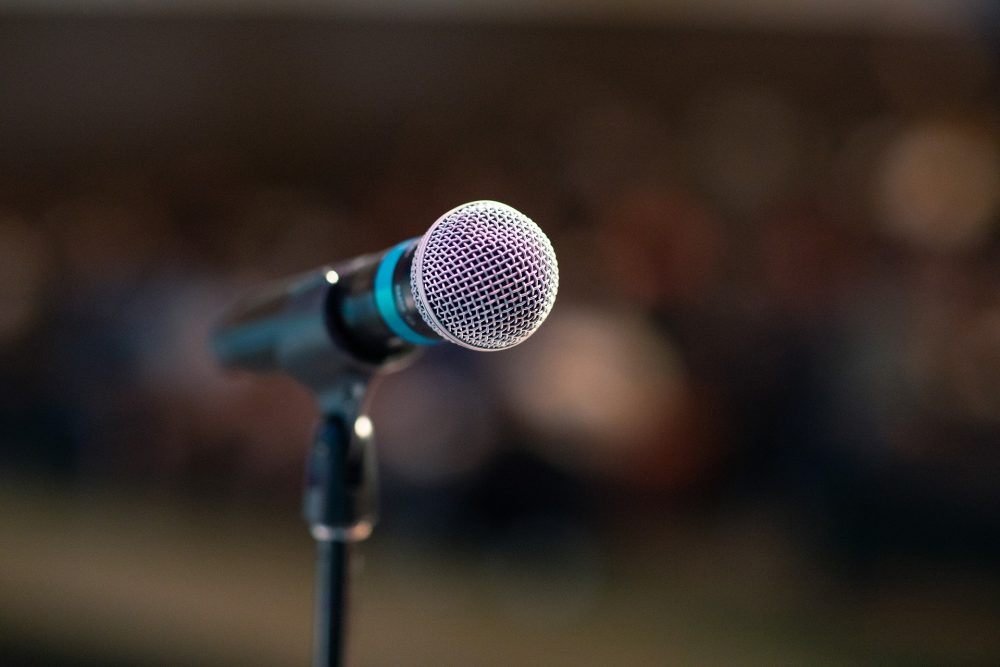
A commemoration speech is a talk that people give at special events as a way to celebrate, recall, or show respect for something, somebody, or a place. For instance, a person can give this speech to celebrate a group, a person, a place, a situation, an event, an idea, or an institution. Some people also call it a ceremonial speech.
Table of Contents
Commemoration speech: basic features, how to write a commemorative speech, commemorative speech topics.
So, is a eulogy a commemorative speech? This is probably the question lingering in your mind right now. Well, the answer is yes. A eulogy is a form of commemorative speech.
Other commemorative speech examples include:
- Nomination speech
- Goodwill speech
- Wedding toast
- Award acceptance speech
Perhaps, a good way to define commemorative speech is by stating that it is more than just informative. In addition to describing something or somebody, the speaker celebrates it. For instance, the speaker can provide a biography of the deceased person, celebrate who they were, say why they deserve praise and encourage their audience to also celebrate their values.
Several characteristics make a commemorative speech stand out. These are the qualities that you should aim at when writing this speech.
They include the following:
- Engaging : When writing this speech, focus on making it more engaging. You can do this by being creative and avoiding clichés. You can also carefully introduce some controversy or trigger introspection. Some people even choose funny commemorative speech topics to be more engaging. Nevertheless, don’t go beyond reasonable limits trying to be funny and engaging.
- Inspiring : This speech should be entertaining while highlighting the values that a person reveres. For instance, you can express the values that you share with the person you’re talking about. Do so in a way that will most likely inspire others. This is very important because the main purpose of this talk is to inspire.
- Be positive : An enthusiastic discourse becomes unnatural, boring, and naïve if the writer is not careful. However, your discourse should be empowering and optimistic when it comes to commemorative speech topics for college students.
- Be relevant : Your talk must be relevant to keep you connected to your audience. For instance, refer to the individual or collective memories with the person you’re talking about that you know will resonate with your audience. Try to be more specific instead of general. For instance, you can mention groups, real people, events, and teachers to engage with your audience.
Giving a ceremonial speech is not just about uttering words from your heart. Unless you’re very creative, you need to sit down, generate commemorative speech ideas, and then compose the write-up. Here are the main steps of the process of writing a commemorative speech:
Do you want to talk about a historical event, share a story about something, or celebrate a loved one? The first step in the process of writing this speech is deciding on the topic. Choose a topic you can comfortably write about. For instance, write a commemorative speech about mom if you know your mother well and you would like to celebrate her.
Once you’ve chosen a topic, research it. For instance, if you have chosen to write a commemorative speech on a famous person, research about them. Read newspapers and books with information or stories about the person. If possible, talk to the people that have direct interactions with them. You can even talk to them personally if possible.
Once you’ve researched your topic, come up with a commemorative speech outline. This should show how you will present your information. It should indicate what will go to the introduction of your speech, body, and conclusion. Identify the main points that you will expound on in the body of your speech.
Most people don’t know how to start a commemorative speech. This is particularly the case when writing a eulogy. It’s something emotional. However, you can start by just writing what is in your mind. Use the notes you wrote when researching your topics to start without thinking much. You can use the outline to organize your speech later.
Taking physical or mental breaks will help your body to regain the strength you need to complete this task. Therefore, if you get too emotional, go out for a walk and then come back. Don’t struggle to write when you can’t concentrate. Experts from MyHomeworkDone will help you, if you’re not sure you cannot complete it.
Once you have the first draft, you can now arrange everything. Read it through to determine what to be in your commemorative speech introduction, body, and conclusion. For instance, you can tell the audience how you met the person you’re talking about in the introduction. Proceed to tell them how you’ve known and worked with the person. Be personal and share things that the audience might not know about you and the person.
Knowing how to write a commemorative speech outline is essential because it enables you to decide where every detail goes. That way, your speech will flow chronologically so that your audience can follow from the beginning to the end. What’s more, your commemorative speech conclusion should have a good ending. It should leave the audience feeling that your story or talk has come to a conclusive end.
Once you’re done editing, read it through to ensure it follows the commemorative speech outline format you created. You can even give a friend or a loved one to read it through and give feedback.
Although there are many commemorative speech topics for college, students should pick what they are comfortable researching and writing about. What’s more, learners should conduct preliminary research about their topics before they start writing. That’s the only way they will know whether they can get adequate information about the topics.
Creating a commemorative speech outline on a person, place, or something is also important before writing. It helps a learner determine whether they can get adequate information for different parts of the speech. If struggling to find good commemorative speech topics, here are some ideas to consider.
- Self-sacrificing of a mom
- Single parents tribute
- Celebrating Christian values
- Humans overcoming major challenges
- Tribute to a veteran
- Tribute to a women’s rights movement
- Tribute to a human rights activist
- Courageous acts during a terrorist attack
- Tribute to a teacher
- Tribute to a friend and a colleague
When choosing the topic to write about, students should pick something meaningful. It should also be a topic for which they have a strong message they want to deliver to the audience. What’s more, a good topic should not be identical to what other people have written about or talked about before. If you need more ideas right now, explore these speech topics from our writers.
Commemorative speech definition describes it as a talk that is prepared for a special event. When writing this speech for college, learners should have this in mind. For instance, a student should imagine themselves giving this speech during their college graduation ceremony. The speech should flow chronologically to make it easier for the audience to follow. It should also show respect for or recall something. Above all, the speech should be about a relevant topic for which a student has a special message to share with the audience.

Leave a Reply Cancel reply
Your email address will not be published. Required fields are marked *
All Formats
Outline Templates
8+ commemorative speech outline templates to make you think different.
Stay hungry. Stay foolish.
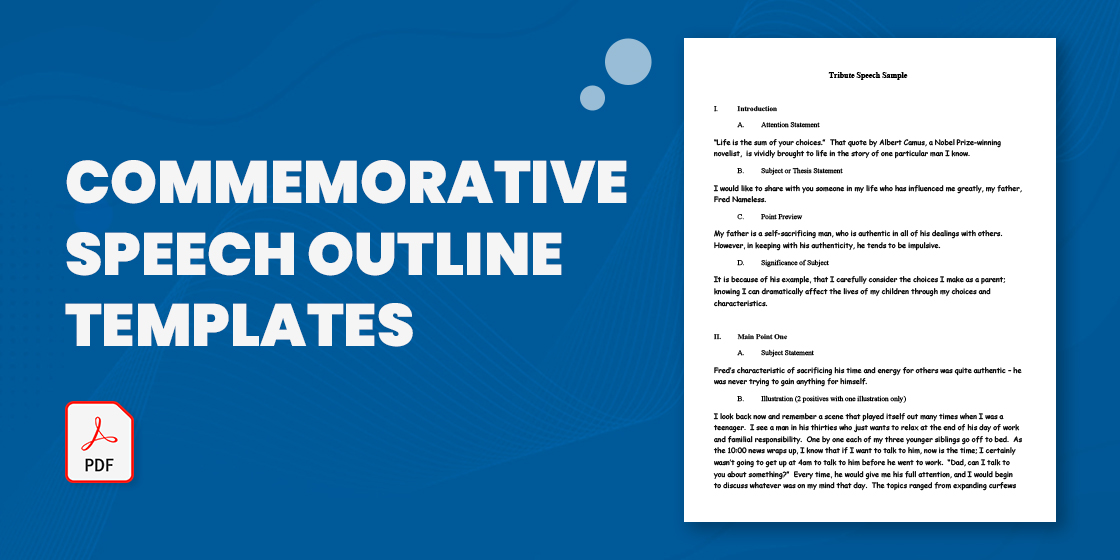
Tribute Speech
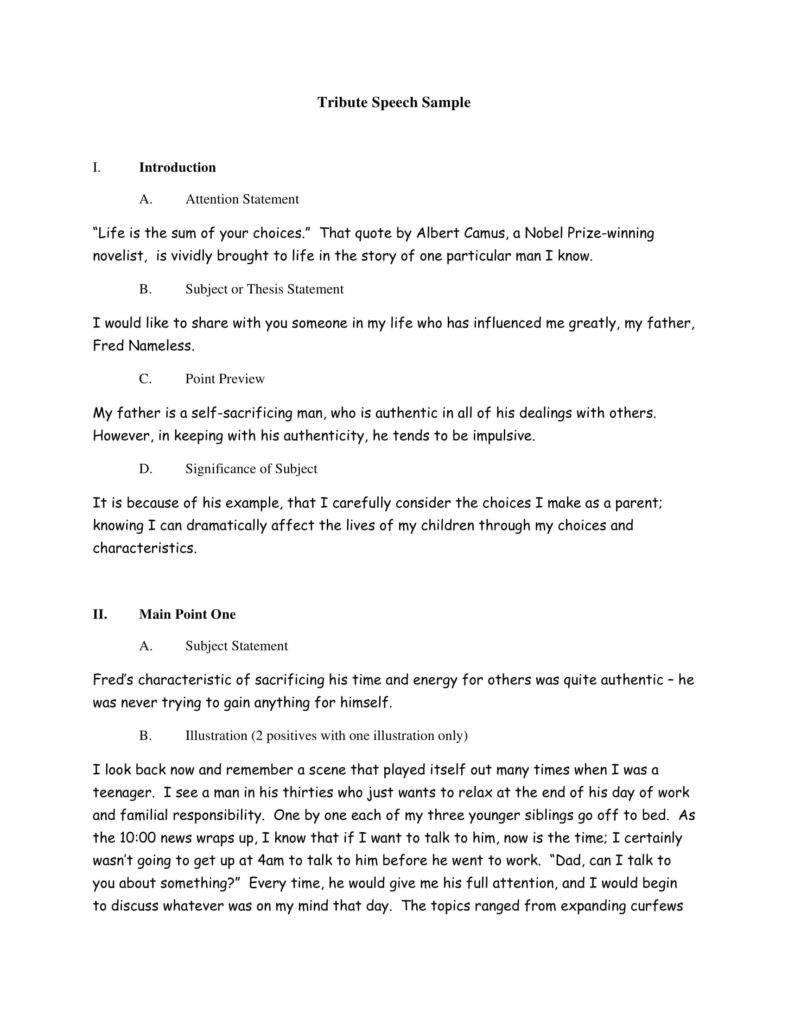
Commencement Speech by Steve Jobs
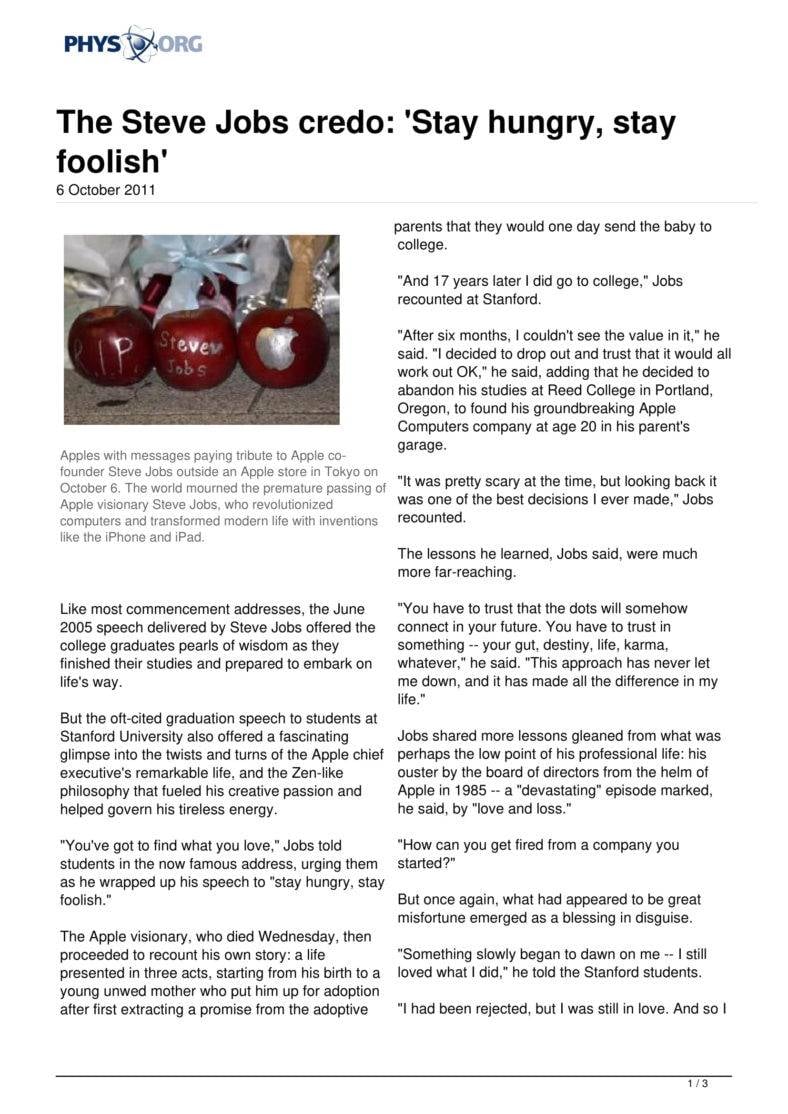
Commemorative Speech Objectives and Instructions
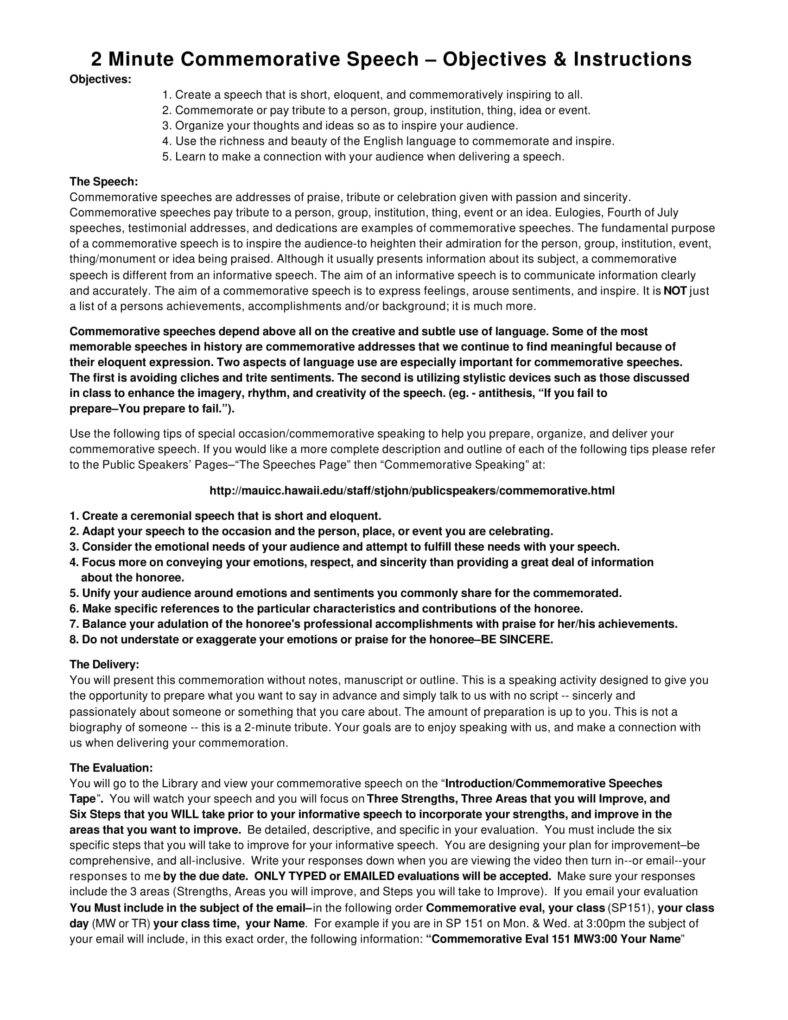
Ceremonial Speech
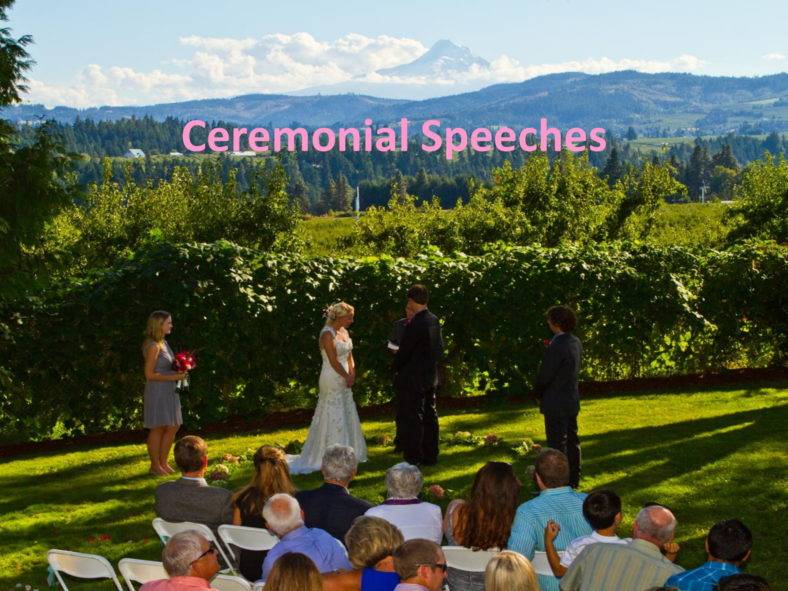
Graduation Speech
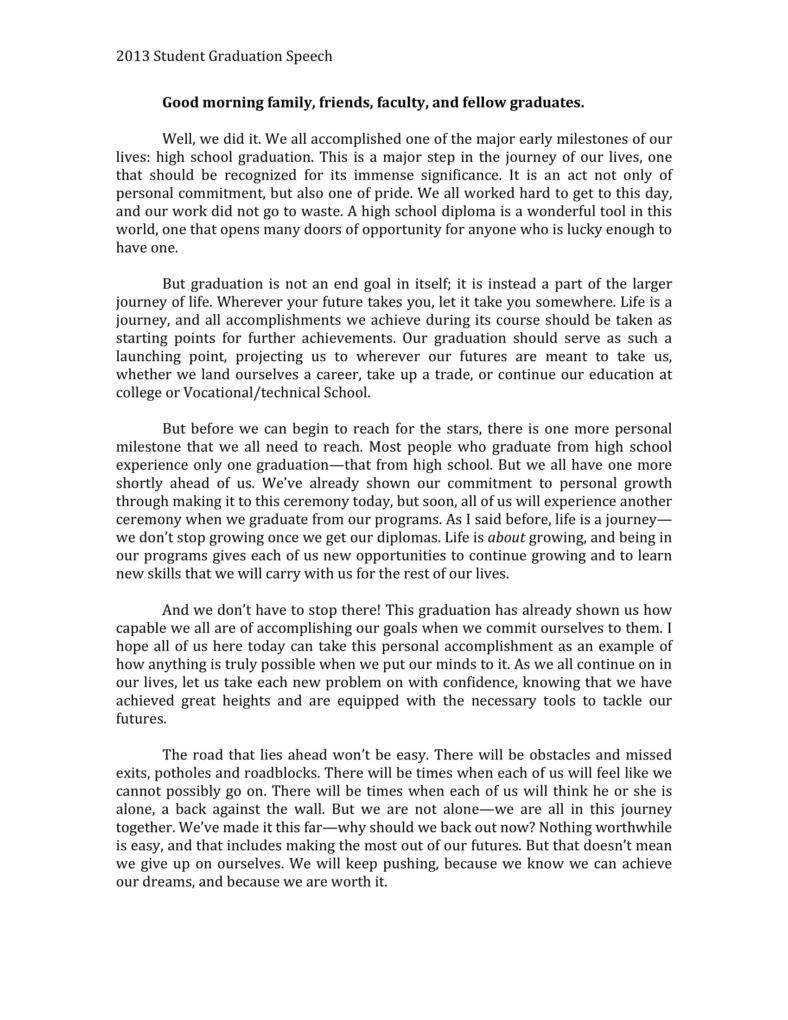
Special Occasion Speech Guide
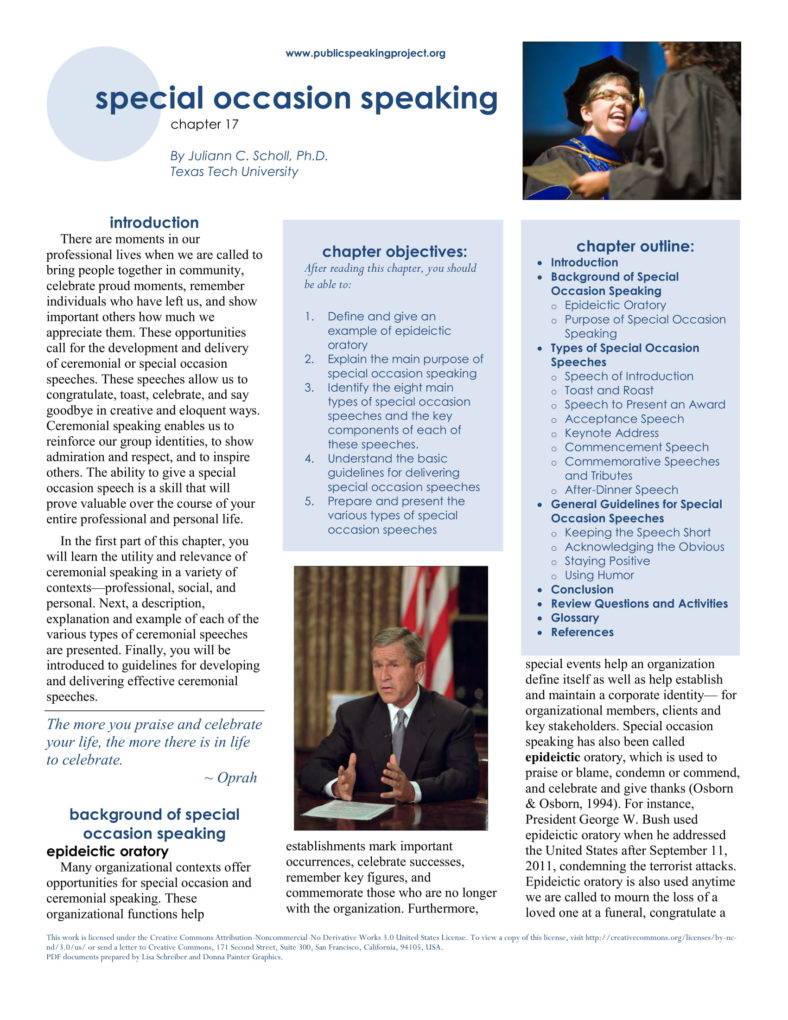
Special Occasion Speech
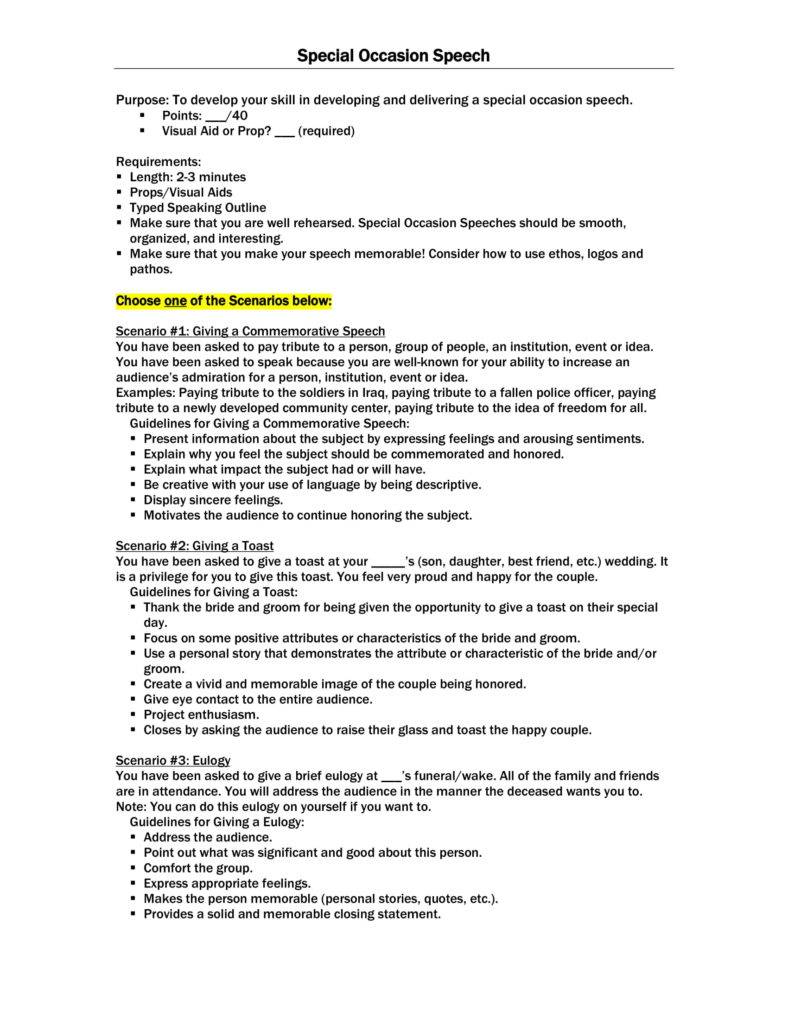
Day Of The African Child Commemorative Speech
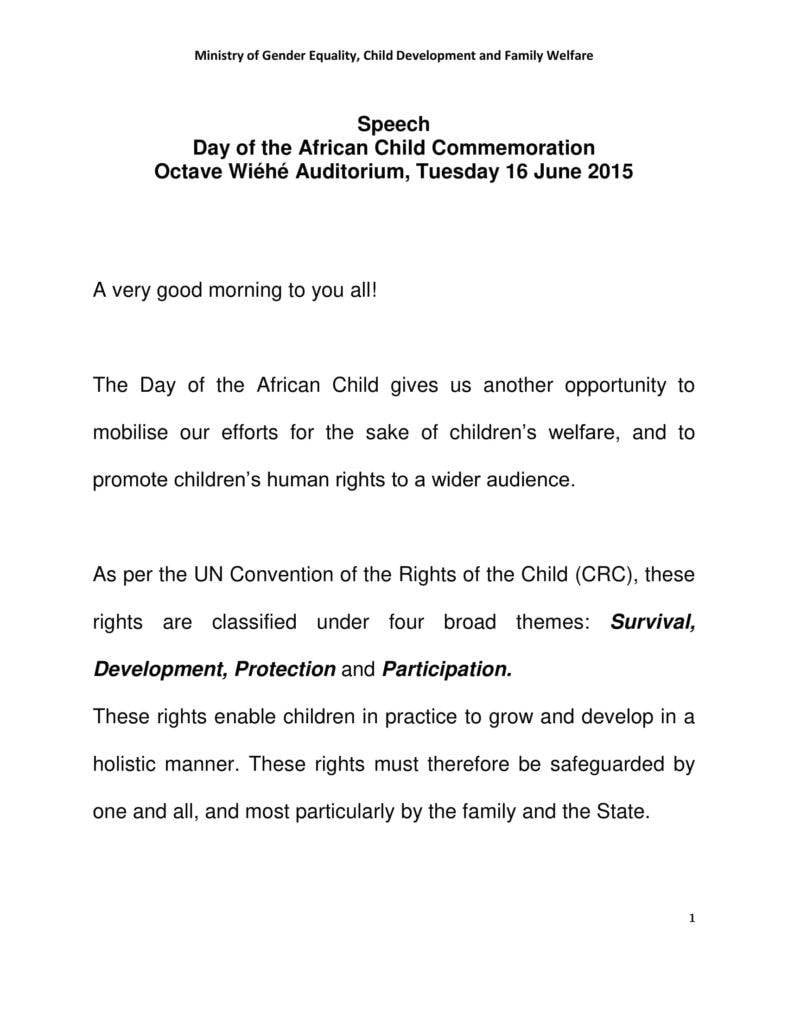
More in Outline Templates
- 10+ Training Outline Templates – PDF, Word, Apple Pages
- 24+ Autobiography Outline Templates & Samples – DOC, PDF
- 10+ Project Proposal Outline in Google Docs | MS Word | Pages | Editable PDF | InDesign | Photoshop | Publisher | PDF
- 12+ Literature Review Outline Templates – PDF, DOC
- 15+ Thesis Outline Templates – Sample, Example
- 11+ Outline Report Templates in Google Docs | Word | Pages | PDF
- 10+ Production Outline Templates
- 12+ Project Outline Templates in Google Docs | Word | Pages | PDF | XLS
- 15+ Meeting Outline Templates in PDF | DOC
- 8+ Project Proposal Outline Templates
- 12+ Outline Templates in Apple Pages
- 10+ Outline Templates in Word
- 10+ Outline Templates
- 15+ Topic Proposal Outline Templates – PDF, Word
- 12+ Research Project Proposal Outline Templates – PDF, Word, Pages
File Formats
Word templates, google docs templates, excel templates, powerpoint templates, google sheets templates, google slides templates, pdf templates, publisher templates, psd templates, indesign templates, illustrator templates, pages templates, keynote templates, numbers templates, outlook templates.
- Legacy Projects
How to Write a Memorable Tribute Speech: Step-By-Step
Updated 07/16/2021
Published 11/16/2019

Sam Tetrault, BA in English
Contributing writer
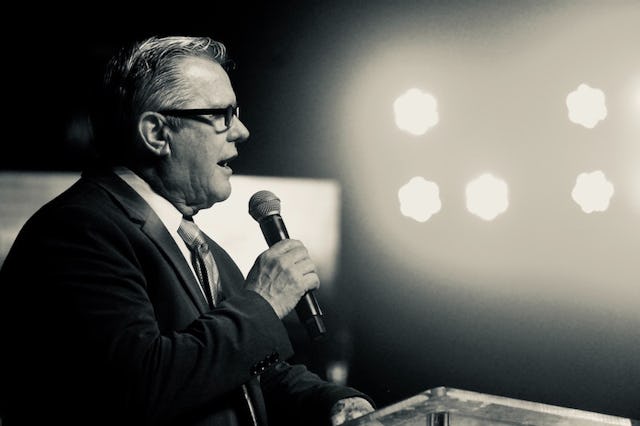
Cake values integrity and transparency. We follow a strict editorial process to provide you with the best content possible. We also may earn commission from purchases made through affiliate links. As an Amazon Associate, we earn from qualifying purchases. Learn more in our affiliate disclosure .
A tribute takes on so many different meanings, it can be hard to remember what it’s supposed to be. But when you write a tribute speech, you can get to its true purpose, which is to honor a specific person. Usually, you can hear tribute speeches at funerals, memorials, and celebrations -- but all tend to follow a similar formula.
Here are some helpful steps for writing a tribute speech:
- Think About the Person
- Write an Outline
- Get the Audience’s Attention
- Make Your Points
- Finish Strong
- Practice Your Speech
Also see our tribute speech topic ideas and tribute speech samples below for some ideas to get you started.
If you’re speaking at a funeral or at a memorial, you might need to write a tribute speech. Or even if you’re speaking at a celebration and simply focusing this piece on a loved one who has died, this guide is for you.
You want your tribute speech to use the right words and to paint an accurate, admirable picture of the person. A heartfelt speech evokes emotion in the listeners and conveys a clear message.
Tip : While speaking at a virtual event, like a live-streamed memorial organized by a service such as GatheringUs , practice your speech using your video conferencing software ahead of time so you can anticipate and fix any audio issues.
Post-loss tip: If you are the executor for a deceased loved one, the emotional and technical aspects of handling their unfinished business can be overwhelming without a way to organize your process. We have a post-loss checklist that will help you ensure that your loved one's family, estate, and other affairs are taken care of.
Step 1: Think About the Person
What purpose does your tribute speech serve? Are you sharing a particular moment in a loved one’s life, writing about their successes, or about their positive attributes? Do you want the audience to come away with a particular message or understanding of your loved one?
Brainstorm a few characteristics or key points you’d like to include in the tribute speech. With these kinds of speeches, it’s ok to evoke emotion and share that feeling with your audience. What emotions do you want your audience to feel? If you’re giving your speech at a memorial, you might want your words to highlight a sense of fondness or happiness. Make sure you are considering your audience as well as the person you’re writing about.
After all, writing a tribute speech for your mother will be very different than writing one for a friend.
Share your final wishes, just in case.
Create a free Cake end-of-life planning profile and instantly share your health, legal, funeral, and legacy decisions with a loved one.
Step 2: Write an Outline
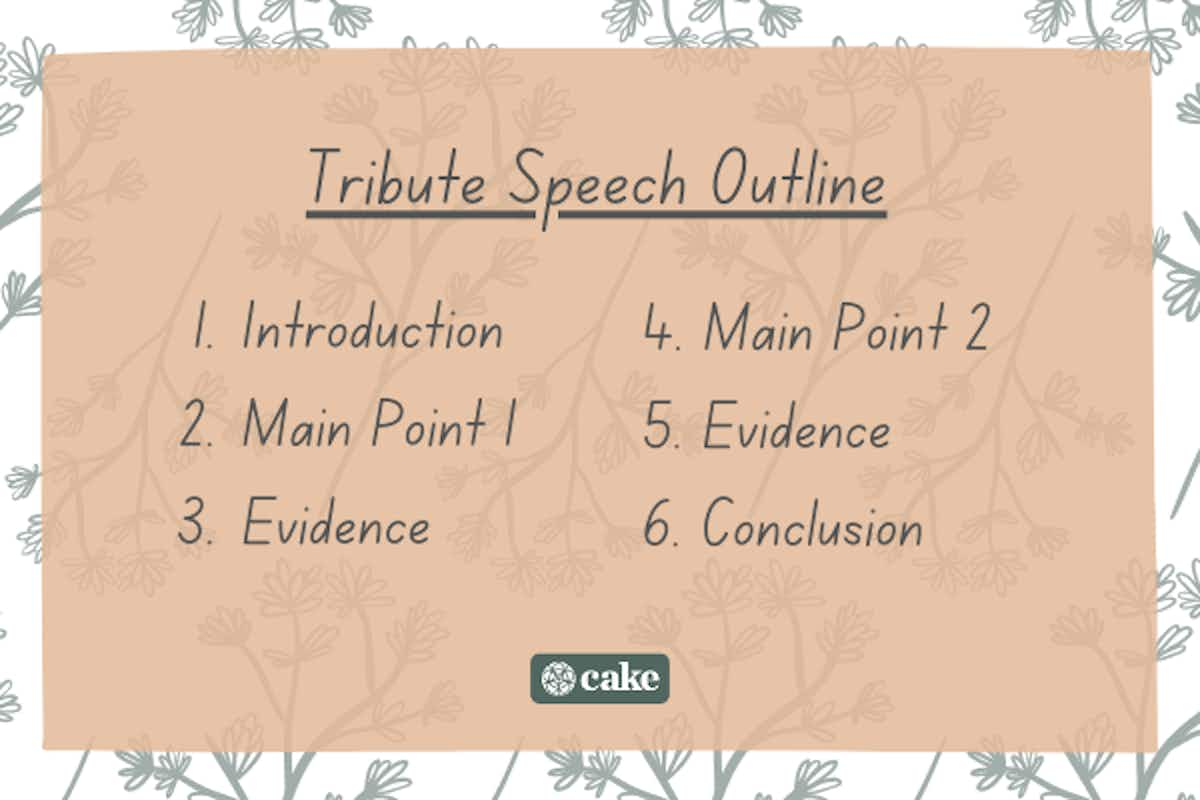
Before you begin writing, create an outline. Writing an outline helps you organize your thoughts before putting pen to paper. Most tribute speeches follow the same format. Here’s a quick guideline to follow:
- Introduction: Who is the speech about? What is your relation to this person?
- Main point 1: Start off with a key characteristic of the person you’re talking about, such as their caring nature or listening skills.
- Evidence: What evidence do you have that supports your main point? For instance, if they were a caring person, talk about a time they helped others.
- Main point 2: What’s another point you’d like to make about the person?
- Evidence: Again, support your point.
- Conclusion: Repeat your crucial points and end with something meaningful.
You can include as many main points as you’d wish, but less is usually more. If you’re giving a speech at a funeral, there may be time limits to consider. Knowing what to say when someone dies is never easy. Using an outline organizes your thoughts in a clear way no matter the purpose of your speech.
Step 3: Get the Audience’s Attention
The hardest part of a tribute speech is often the introduction. How do you capture the audience’s attention? If your speech is during a funeral, for instance, emotions are already high. If you’re giving a speech at another event or celebration, you similarly need to capture attention. How do you hook listeners with your tribute?
Start by relating to the listeners themselves. You need to appeal to the audience on a personal level to develop a connection with your words. If you’re speaking at a funeral, remind them how the deceased person brought everyone together. Open with your relationship with this person, and talk about your loved one’s role in your life.
A good way to start is with a personal story. Humans naturally are drawn to stories. Including one at the beginning of your speech brings the audience closer to you. From there, it’s easier to share your main points with the listeners’ full attention.
Step 4: Make Your Points
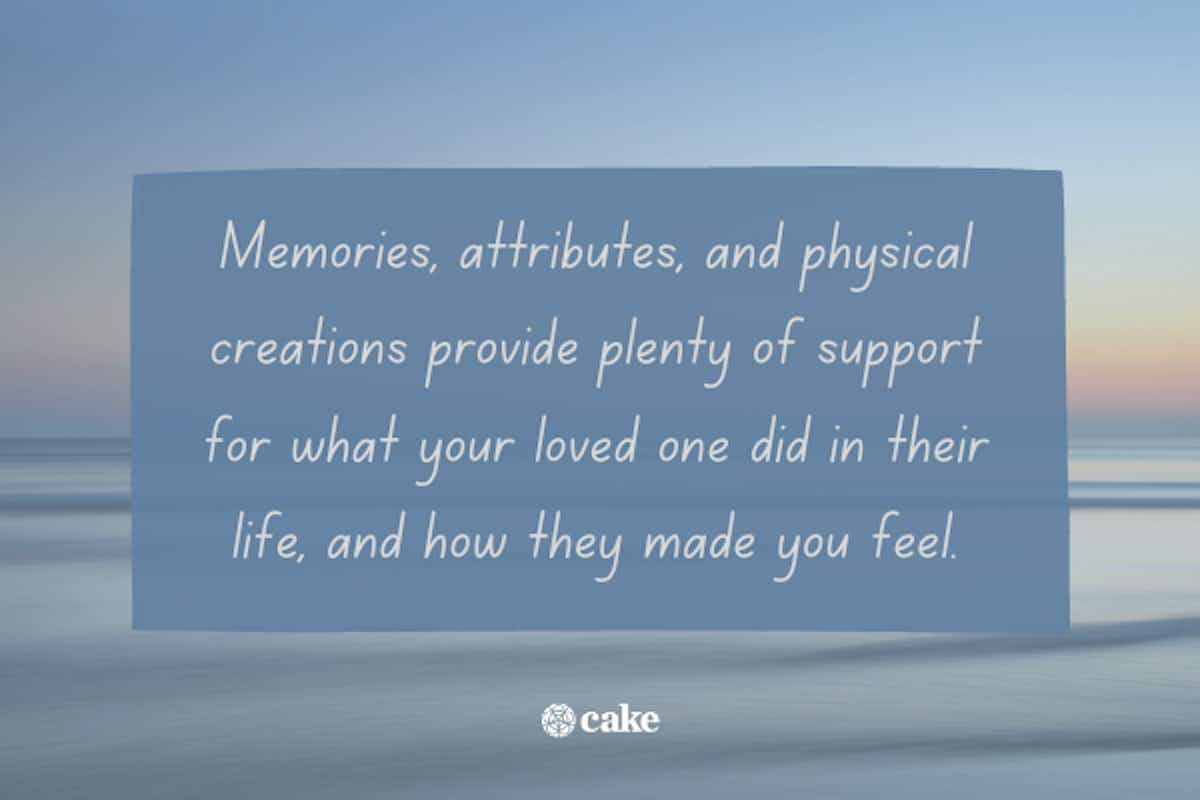
It might be tempting to drag out your introduction, especially if you’re using a personal take to capture the audience’s attention. Consider keeping the introduction brief so you can get to your point sooner rather than later. A concisely worded speech makes more of an impact through brevity and pauses than long drawn-out sentences.
With a tribute speech, you might include any of the following:
- The person’s characteristics
- The person’s accomplishments
- The person’s lasting impact
- Your experience with the person
All of these need real-life evidence. Memories, attributes, and physical creations provide plenty of support for what your loved one did in their life, and how they made you feel. How you share these main points is up to you.
Consider how you knew this person personally. Do you have a particularly funny or touching memory that was not shared widely? Did you see a special side of this person? These are all valuable questions to answer when writing a memorial tribute.
Step 5: Finish Strong
Finish your tribute speech on a high note. Popular quotes or poems can provide a way to tie up your speech. Or even ending with a quote or familiar saying from your loved one can leave your audience fondly remembering the person. Wrapping up your tribute speech can also be used to recall your main points and making a final statement about the person.
You might ask the audience to remember their own favorite memory of this person or to think of them when they visit a certain place. Either way, leave them with something memorable.
Step 6: Practice Your Speech
Finally, before you present, it’s time to practice. If you’re anxious, use these tips to put you at ease:
- Think of your speech as a performance, not just a reading
- Make eye contact with your audience
- Stand up straight and tall
- Focus on your storytelling skills
- Let your passion show
As long as you’re putting emotion into the topic, this shines through for the audience. Practice really does make perfect. Don’t be afraid to share your speech with your friends and family before the big day.
Tribute Speech Topic Ideas
For inspiration planning your tribute speech, review these topic ideas below. Your tribute can be about anything that matters to you.
- Write about a physical tribute to made for your favorite person.
- Write about a loved one who passed.
- Describe an event involving yourself and a loved one.
- Share a memory.
- Give a tribute to a place that matters to you.
- What movie or book inspired you?
- Did an incident ever change your life?
- Give a toast to someone who matters to you.
- Share someone or something that changed your mind.
- Explain the relationships that mean the most to you.
Tribute Speech Samples
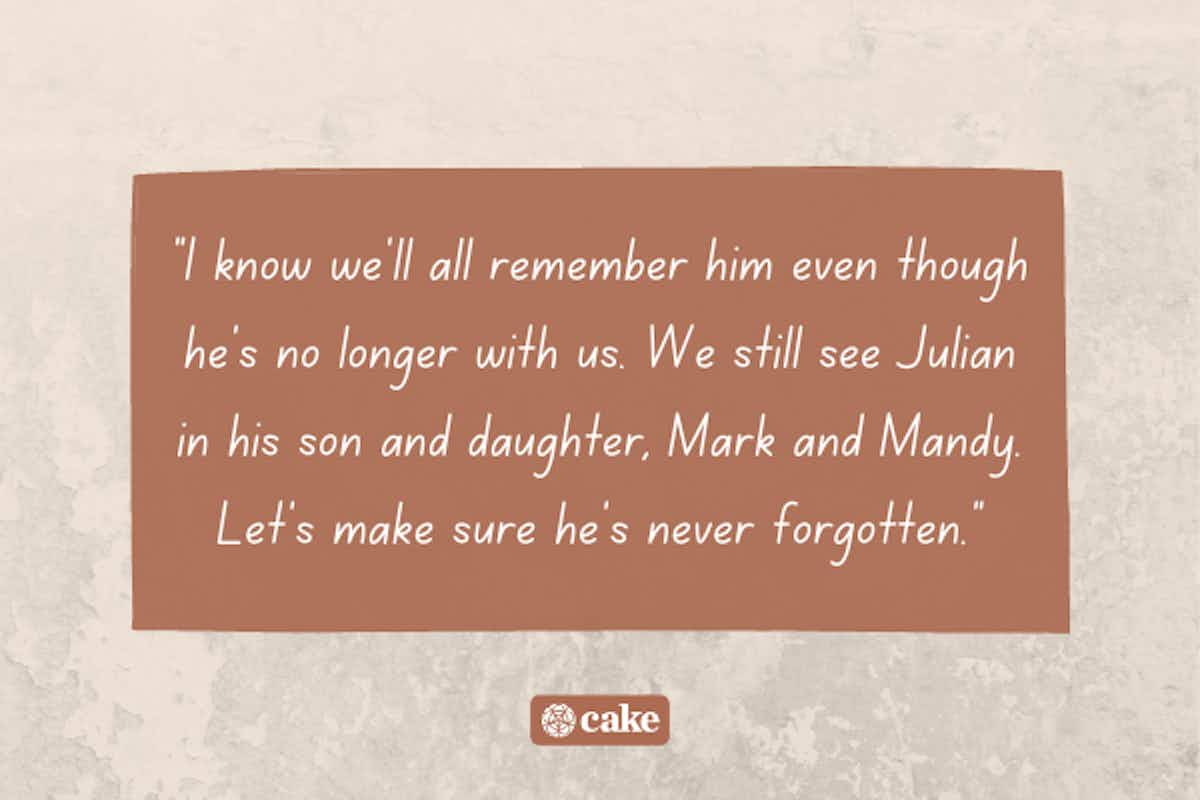
To get a strong feel for what a tribute speech looks like, read through these samples below. Each speech serves a different purpose, but you’ll see how they impact the audience through storytelling and compassion.
Tribute to a friend after their passing
"Good evening, everyone. Thank you for joining me to celebrate the life of my dear friend, Julian. All of us here admired Julian’s devotion to his family. I first met Julian through his wife, Stephanie. There was never a time when he wasn’t raving about Stephanie and all of their adventures together. I remember specifically one late night at work. Julian was the first to tell the whole office to head home. He always said nothing was more important than family, and that was certainly true. That’s the legacy Julian leaves behind: his shining family. I know we’ll all remember him even though he’s no longer with us. We still see Julian in his son and daughter, Mark and Mandy. Let’s make sure he’s never forgotten."
Tribute to a coworker "Thanks for joining me at this year’s celebration. Today, I’d like to highlight the success of Luisa, one of our best underwriters. Luisa is dedicated to her clients and helping them secure the home of their dreams. When Luisa first began working here, she would spend hours pouring over each applicant’s documents. She wanted to get everything right the first time. “The family is counting on us,” she would say. Luisa is right. It’s this kind of passion and attention to detail that makes her such an asset to our company."
Tribute to a sibling for a wedding
"I’m so thankful to be speaking about June on her wedding day. June and I have known each other for basically our whole lives, give or take the two years of me being an only child. Since then, June has always been the one who had my back. From the playground to college, she was always there. June is the first person I want to tell about my day — even if she’s bad at answering her phone! I am so grateful for our special bond. I just wanted to say thank you to my little sister for being my rock.:
Write a Powerful Tribute Speech
With the steps and examples listed above, hopefully you have some inspiration to help you write a top-notch tribute speech. From learning how to hook listeners to find the right words to say, you have many paths you can take with a tribute.
And in the end, a tribute speech is a commemoration of someone special. Whether you’re giving your speech as a sympathy message at a funeral or at a celebration, make the most of this opportunity.
Everyone deserves to be remembered. Creating a tribute speech is a powerful way to evoke emotion and build strong relationships. They are for personal and professional relationships, remembering those who have died, and even just reminding us of the things we love most. It’s time to put your own pen to paper in honor of someone special.
For more help finding the right words, read our guide to what to say on a death anniversary .
Categories:
You may also like.

How to Write a Commemorative Speech: Examples & Tips

How to Write a Funeral Speech for Dad From a Daughter

How to Write a Tribute Speech to Your Mother: Step-By-Step

How to Write an Inspiring Farewell Speech: Step-By-Step

How to Write an Effective Persuasive Speech Outline: 5 Key Elements
- The Speaker Lab
- April 14, 2024
Table of Contents
If you’re a speaker, you are probably well familiar with the path from initial speech drafts to the day you actually present. By its nature, speech delivery is a journey filled with obstacles, yet it’s simultaneously an adventure in persuasion. With a well-crafted persuasive speech outline , you can do more than just present facts and figures to your audience. You can weave them into a narrative that captivates, convinces, and converts.
A meticulously planned persuasive speech outline isn’t just helpful; it’s essential. Crafting this blueprint carefully lets you deliver your message more effectively, making sure each point lands with the impact you’re aiming for. To help you achieve this impact, we have some tips and tricks for you to try.
Writing an Effective Persuasive Speech Outline
When we talk about persuasive speeches , we’re diving into the art of convincing others to see things from a certain point of view. Your speech is your one shot to grab attention, build your case, and inspire action. Your secret weapon for achieving this is your speech outline. In your speech outline, you want to touch on several key elements.
- Pick your fight: Start by zeroing in on what you really want to change or influence with this speech.
- Support your claim with evidence: Identify those key points that back up your stance to appeal to your audience’s rational side .
- The emotional hook: Weave in stories or facts that hit home emotionally .
- Avoid the kitchen sink approach: Don’t throw everything at them hoping something sticks. Be selective and strategic with the info you share.
- Nail that closer: Your conclusion isn’t just goodbye; it’s where you charge your audience with a call to action.
These elements form the backbone of your persuasive speech. By including these in your talk’s outline, you can’t go wrong.
Free Download: 6 Proven Steps to Book More Paid Speaking Gigs in 2024
Download our 18-page guide and start booking more paid speaking gigs today!
Establishing Your Main Objective and Structuring Your Points
Now that you have a general idea of what goes into a persuasive speech outline, let’s break a couple of these pieces down and look at them a little more closely.
Identifying the Purpose of Your Persuasive Speech
When writing your speech, you first need to nail down why you’re doing this in the first place. In other words, identify your main objective. After all, choosing to speak up isn’t merely about the desire to express oneself; it’s deeply rooted in understanding the effect you hope your discourse will unleash. Do you hope to sway opinions towards the belief that animal experimentation is a relic of the past? Or perhaps persuade them that social media does more good than harm? Whatever your cause, identifying your main objective will help keep you on track and avoid rambling.
Organizing Key Points for Maximum Impact
Once you’ve determined what you want to persuade your audience of, you can start building your argument. Specifically, you can determine your key points. Key points support your position on a topic, proving to your audience that you have actual reasons for taking your position.
To pack the most punch, arrange these key points in a logical order. Consider how you might connect your key points. Are there some that can be grouped together? The flow of your argument matters just as much as the argument itself, and a disjointed argument won’t do anyone any favors. As you organize your key points, consider these tips:
- Lead with strength, but don’t throw all your cards out at once.
- Build upon each point; important transitions between them can make or break audience engagement.
- Finish strong by tying back everything to the emotional chord you struck at the beginning.
Nailing these steps will ensure that when you speak, your message doesn’t just echo—it resonates.
Selecting Compelling Topics for Your Persuasive Speeches
Let’s face it, picking the right topic for your persuasive speech outline is half the battle. But what makes a topic not just good, but great? First off, it needs to spark interest, both yours and your audience’s. If you’re not fired up about it, chances are they won’t be either. Second, make sure the topic is something relevant. It should resonate with your listeners’ experiences or touch on their concerns and aspirations. Lastly, your topic has to be something you can research and back up with solid facts and expert opinions.
For ideas to get you started, check out a variety of speech topics here .
Enhancing Persuasion Through Rhetorical Appeals
The art of persuasion is something that’s been studied since ancient Greece. Back then, Greek philosopher Aristotle came up with the three rhetorical appeals . Each one described a different way of convincing your audience of your position. Together, these appeals help you form a rock-strong argument, making them worth learning.
Building Credibility with Ethos
To get people on your side, you first need to win their trust. That’s where ethos comes into play. Demonstrating to your listeners that you’re both trustworthy and deserving of their attention hinges on transparency about your qualifications, genuine self, and the wisdom gained from occasional setbacks. Letting folks know why they should listen can make all the difference.
Connecting with the Audience Through Pathos
At some point, we’ve all been moved by a story or an ad because it hit right in the feels. That sort of emotional appeal is called pathos , and it’s powerful stuff. If you want people really invested in what you’re saying, then be sure to use this appeal in your presentation. To harness the power of pathos, try telling a story , especially one your audience can relate to. The key is authenticity—sharing true experiences resonates more than anything fabricated ever could.
Strengthening Arguments with Logos
Last but not least, we have logos, our logical appeal. Oftentimes, this logical appeal entails facts and data points, which are used to back up what you’re selling, turning skeptics into believers. But just because you’re listing facts and figures doesn’t mean this part has to be boring. To keep your audience engaged, craft persuasive narratives and then ground them in robust proof. Giving your story to go with your numbers doesn’t just help keep them engaged, it also helps the information stick.
The Importance of Supporting Evidence and Counterarguments
In your persuasive speech outline, you need to note compelling evidence for each key point. In addition, you’ll want to address opposing views.
Gathering and Presenting Convincing Evidence
No matter how trustworthy you seem, or how compelling your stories are, most people need tangible proof. That’s where concrete evidence steps into the spotlight. To fortify your argument and boost its believability, sprinkle in a mix of hard data, customer stories, numerical evidence, and endorsements from authorities. To illustrate this data for your audience, you may find it helpful to create a slideshow . Supporting every assertion with research is an essential part of any persuasive speech. Without it, arguments inevitably sound flimsy and unconvincing.
Addressing Opposing Views Effectively
Although it may seem counterintuitive, address counter-arguments head-on in your persuasive speech outline. It might feel like walking into enemy territory but it actually strengthens your own argument. By acknowledging opposing views, you’re showing that not only do you know what they are, but also that they don’t scare you.
When you address these counter-arguments, demonstrate your understanding. Again, this is where your good research skills are going to come in handy. Present the facts, and ditch biased explanations. In other words, don’t mock or belittle the other side’s viewpoint or you’ll undermine your own trustworthiness. Instead, explain opposing viewpoints with neutrality.
Adopting this strategy not only neutralizes possible objections but also enhances your stance. Plus, this makes for an engaging dialogue between both sides of any debate, which keeps audience members hooked from start to finish.
In essence, tackling counter-arguments is less about winning over naysayers and more about enriching discussions around hot-button issues. At its core, persuasion isn’t just convincing folks; it’s sparking conversations worth having.
Crafting a Captivating Introduction and Conclusion
Now that you have the body of your persuasive speech outline, it’s time to talk beginning and end. To really hit your message home, you want to grab your audience’s attention at the beginning and call them to action at the end.
Creating an Engaging Hook to Capture Attention
The opening of your speech is where you need a good first impression. To hook your audience, consider starting with an intriguing question, a surprising fact, or even a short story related to your topic. Whatever route you choose, keep it interesting and concise, so that you can transition into the rest of your persuasive speech outline.
Concluding with a Strong Call to Action
Crafting strong conclusions is about leaving your readers feeling pumped and ready to jump into action. After all, if you’ve argued convincingly enough, your audience should be ready to act. To channel this energy, urge listeners towards specific actions. Here are some strategies:
- Suggest clear next steps: Don’t leave your audience hanging wondering what’s next. Give them concrete steps they can take immediately after reading.
- Create urgency: Why wait? Let folks know why now is the perfect time to act.
- Show benefits: Paint vivid pictures of how taking action will positively impact their lives or solve their problems.
With that captivating hook and a decisive call-to-action, you are one step closer to presenting an unforgettable speech.
Utilizing Monroe’s Motivated Sequence for Persuasive Structure
As you finish off your persuasive speech outline, you may be wondering how best to structure your speech. If that’s you, then Purdue University professor Alan H. Monroe has some answers. In his book “Monroe’s Principles of Speech,” the professor outlines Monroe’s Motivated Sequence, the best structure for persuasive speeches. Each step is broken down below.
Attention: Grabbing the Audience’s Focus
You’ve got something important to say. But first, you need them to listen. Start with a bang. Throwing out a shocking truth, posing a thought-provoking query, or sharing an enthralling tale could work magic in grabbing their attention. It’s all about making heads turn and ears perk up.
Need: Highlighting the Issue at Hand
Now that they’re listening, show them there’s a gaping hole in their lives that only your message can fill. Paint a vivid picture of the problem your speech addresses.
Satisfaction: Proposing a Solution
This is where you come in as the hero with a plan. Introduce your solution clearly and convincingly. How does it patch things up? Why does it outshine merely applying quick fixes to deep-rooted issues? Give your audience hope.
Visualization: Helping the Audience Visualize Benefits
Show them life on the other side of adopting your idea or product—brighter, easier, better. Use vivid imagery and relatable scenarios so they can see themselves reaping those benefits firsthand.
Action: Encouraging Audience Action
Last step: nudge them from “maybe” to “yes.” Make this part irresistible by being clear about what action they should take next—and why now’s the time to act. Whether signing up, voting, or changing behavior, make sure they know how easy taking that first step can be.
Learn more about Monroe’s Motivated Sequence here .
What Type Of Speaker Are You?
Click below to discover your Speaker Archetype and how to start getting booked and paid to speak!
Overcoming Public Speaking Fears for Effective Delivery
Let’s face it, the thought of public speaking can turn even the most confident folks into a bundle of nerves. But hey, you’ve got this. Dive into these expert strategies and you’ll find yourself delivering speeches like a seasoned orator in no time.
Techniques to Build Confidence in Public Speaking
If you’re feeling nervous on the big day, these three techniques are perfect for you. Take a look!
- Breathe: Deep breathing is your secret weapon against those pesky nerves. It tells your brain that everything is going to be okay.
- Pose like a superhero: Stand tall and strike a power pose before you go on stage. This isn’t just fun; science backs it up as a confidence booster .
- Kick perfectionism to the curb: Aim for connection with your audience, not perfection. Mistakes make you human and more relatable.
The goal here is to calm yourself enough to be able to deliver your persuasive speech outline with confidence. Even if you still feel a little nervous, you can still present an awesome speech. You just don’t want those nerves running the show.
Practicing Your Speech for Perfect Execution
If you know that you tend to get nervous when public speaking, then you don’t want to be running through you speech for the first time on the big day. Instead, practice beforehand using these techniques.
- The mirror is your friend: Practice in front of a mirror to catch any odd gestures or facial expressions.
- Vary your voice: As you deliver your speech, let your voice rise and fall to match what you’re sharing. Avoid speaking in a monotone.
- Say no to memorization: Rather than memorizing every word, learn key points by heart. You want to sound natural out there.
Remembering these steps won’t just help you tackle public speaking fear, but will also polish those all-important public speaking skills .
Once you’ve honed the skills you need to write a persuasive speech outline, the only thing left to do is to get out there and practice them. So take the rhetorical appeals—ethos, logos, and pathos—and practice weaving each element into your speech. Or take Monroe’s Motivated Sequence and work on structuring your outline accordingly.
Prepare well and when you hit the stage, you have not just a well-prepared persuasive speech outline, but also the power to alter perspectives, challenge the status quo, or even change lives.
- Last Updated: April 11, 2024

Explore Related Resources
Learn How You Could Get Your First (Or Next) Paid Speaking Gig In 90 Days or Less
We receive thousands of applications every day, but we only work with the top 5% of speakers .
Book a call with our team to get started — you’ll learn why the vast majority of our students get a paid speaking gig within 90 days of finishing our program .
If you’re ready to control your schedule, grow your income, and make an impact in the world – it’s time to take the first step. Book a FREE consulting call and let’s get you Booked and Paid to Speak ® .
About The Speaker Lab
We teach speakers how to consistently get booked and paid to speak. Since 2015, we’ve helped thousands of speakers find clarity, confidence, and a clear path to make an impact.
Get Started
Let's connect.
Copyright ©2023 The Speaker Lab. All rights reserved.

IMAGES
VIDEO
COMMENTS
Learn how a ceremonial speech works with information on what makes this type of speech different and how to write a ceremonial speech with step-by-step directions. ... A real speaker dives deeping, making a larger point from the full speech. Step 2. Begin with an outline. While you might be ready to jump right into writing your speech, hold on ...
When outlining your speech, make sure to decide how much time you'd like to give each of your main points. You might even consider setting specific timers during rehearsals to get a real feel for each part's duration. Generally speaking, you should allot a fairly equal amount of time for each to keep things balanced.
Step 1: Start with an Attention-Grabbing Opener. Your speech needs to capture the audience's attention from the very beginning. So start your commemorative speech with a compelling story, a relevant quote, a rhetorical question, or a surprising fact. The goal is to make the audience want to listen.
Videotape yourself. The best way to practice your speech is by recording yourself. So, take a camera and capture yourself giving a ceremonial speech. Now, take a look at the video you made and write down everything you liked about it and everything you didn't like about it.
This kind of speech includes personal touch and the tips and tricks given here will help you write a speech successfully. Commemorative speech requires a focus on the past, present, and future aspects of the topic. For instance, success, loyalty, wisdom, courage, hope, etc. It can also be an award acceptance speech, or a eulogy to honor someone ...
In all speeches, the audience should feel like you are considering their needs, this is especially true in a ceremonial speech. In a ceremonial speech, your audience in some way becomes part of the speech. To achieve this, you should use a lot of phrases like "we" and "our." In the graduation speech by Matthew McConaughey, he uses "we ...
Commemorative Speech Definition. A commemorative speech is a special speech given at a ceremony that praises the value of a person, place, event, idea, or institute. This speech is more than just a verbal compliment, it's an expression of gratitude and acknowledgement. The purpose of writing this speech is to:
In a retirement or graduation speech or a farewell speech, the piece emphasizes achievements and inspires the audience to look ahead with hopeful eyes. Meanwhile, an award acceptance speech spotlights the recipient's feat and the people who helped them achieve it. There are various types of ceremonial speeches.
Whether you're writing a speech for a parent, friend, or colleague, the highlights remain the same. Usually, you would give these speeches at funerals, college graduations, and weddings. This means many tips are available. A common one to bear in mind when you review the templates below is the value of specifics. Being very specific and ...
After your opening, you can organize the rest in one of two ways: 1. Enumerate the positives. Make each of the speaker's virtues the topic sentence of a paragraph. Then fill the rest of the paragraph with biographical or anecdotal material that demonstrates the validity of the topic sentence. For example:
A commemorative speech honors or celebrates a person, event, or occasion. They might remember someone who has died or mark a birthday, anniversary, founding, or history of achievements. The speech should inspire listeners to reflect and feel pride, gratitude, or loss. In public speaking, a commemorative speech pays tribute to a person, a group ...
Before you begin writing your outline, you should take a step back and think about your speech as a whole. First, think about the 3 keystones for your presentation or speech, i.e. the audience, your subject matter and of course, you, as the speaker. Then, write a few notes down about each keystone and how they relate with each other.
How to begin writing a tribute speech. The first step in your process is finding out as much as you can about the occasion itself and then deciding on a topic, (if it hasn't already been decided for you). You'll want to know: who the audience is. whether you are the only speaker, or one in a series of speakers.
Ceremonial speeches are not simply informative, they are the the reason on why we celebrate these events in the first place. Think of it as a thank you note in a very formal way. You may also see how to write an appreciation speech. Types of Ceremonial Speeches. Ceremonial speeches are not only limited to weddings and graduations.
Breathe. How do you feel? Writing a commemorative speech, much like writing a eulogy, can be an emotional thing to do. If you're not in a good headspace or a quiet, reliable place to work, your speech will reflect this. Don't write your speech until you're ready. Once you are ready, open up your notebook or document.
This tutorial is a practical time-saver that will enable you to get good at speeches. Watch our tutorial on How To Prepare A Commemorative Speech from one of...
Are you writing a commemorative speech and looking for some tips and advice? Learn how to write something meaningful, respectful and courteous here.
There are 6 modules in this course. The most memorable speeches inspire, entertain, and praise. By blending stories and eloquence, great speeches highlight the core values motivating an audience. You might need to do this in a keynote address, a eulogy, or simply a business meeting. Inspiring audiences is a common, but difficult writing challenge.
Step 5. Write your speech's conclusion. The conclusion should recap important values and share a hope for the future. To warn your audience your speech is coming to an end, use a concluding transitional phrase. For example, a eulogy's conclusion might read "All in all, Harry lived a life full of passion, care and love.
This heartfelt, emotional maid of honor speech was given by a college friend of both the bride and the groom. She recounts the story of how she first met the bride, and then tells the bride and groom's love story as she saw it unfold. "It was obvious there was something truly amazing between the two of them.
0. A commemoration speech is a talk that people give at special events as a way to celebrate, recall, or show respect for something, somebody, or a place. For instance, a person can give this speech to celebrate a group, a person, a place, a situation, an event, an idea, or an institution. Some people also call it a ceremonial speech.
8+ Commemorative Speech Outline Templates to Make You Think Different. Stay hungry. Stay foolish. Two phrases. Two, short, powerful phrases that gave more advice and held more weight and meaning than so many self-help books put together, resonating more than ten years since the world's most famous creative genius delivered his commencement ...
Here are some helpful steps for writing a tribute speech: Think About the Person; Write an Outline; Get the Audience's Attention; Make Your Points; Finish Strong; Practice Your Speech; Also see our tribute speech topic ideas and tribute speech samples below for some ideas to get you started. If you're speaking at a funeral or at a memorial ...
We designed this free online public speaking course to show you how to deliver ceremonial speeches effectively. We will teach you a step-by-step method to help you write and deliver wedding speeches, acceptance speeches, retirement speeches, eulogies and even motivational speeches. COURSE PUBLISHER -. Start Course Now.
Writing an Effective Persuasive Speech Outline. When we talk about persuasive speeches, we're diving into the art of convincing others to see things from a certain point of view. Your speech is your one shot to grab attention, build your case, and inspire action. Your secret weapon for achieving this is your speech outline.